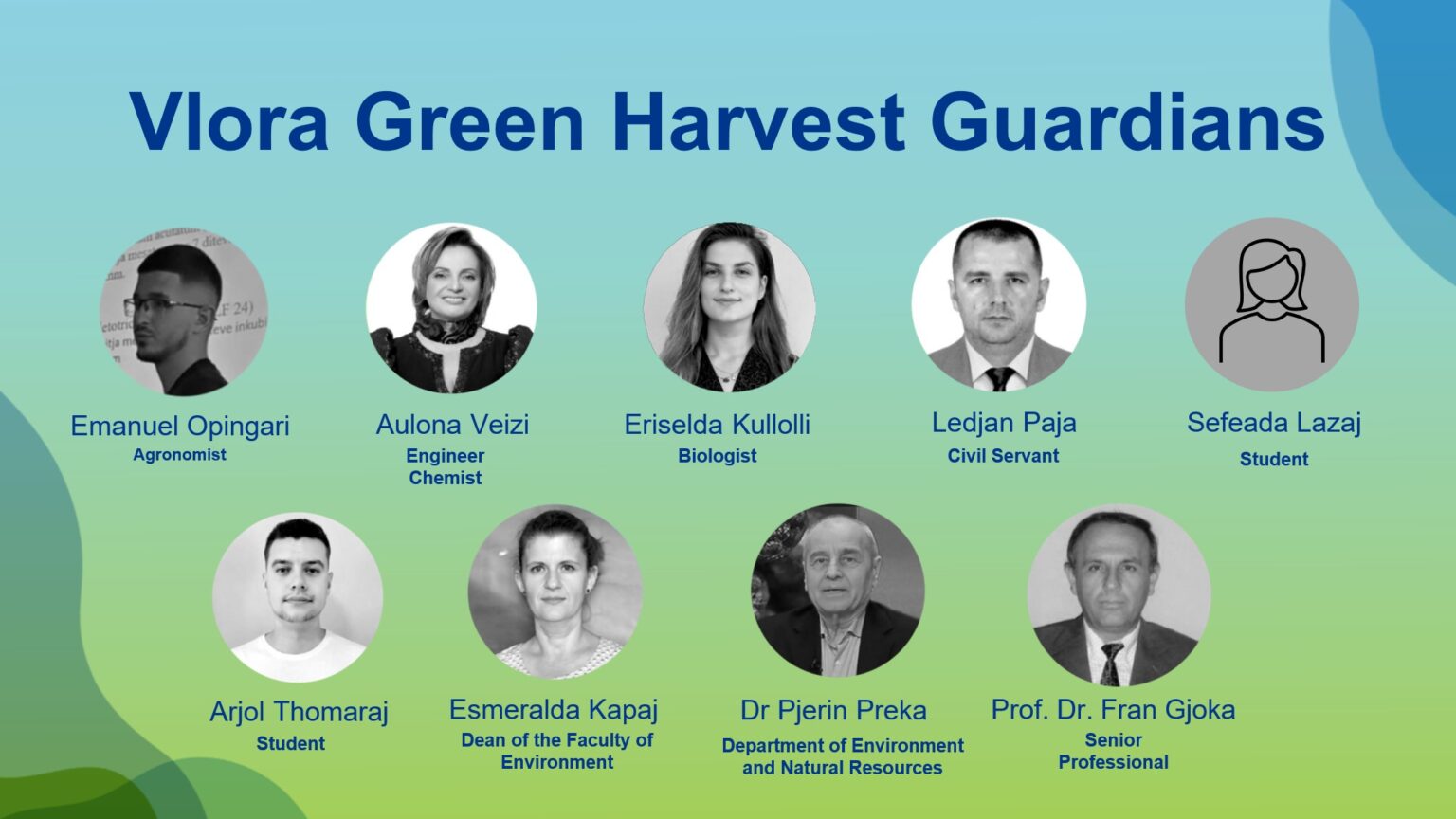Meet the 27 teams that participated in the EU Final!🎉
On October 10-11, teams from across Europe showcased their solutions online to a jury panel of high-level experts gathered in Brussels, where three teams were selected as the European Citizens Hackathon Champions.
Explore the challenges tackled at the local hackathons and learn more about the teams and their members.

Allium
Members: Natalia Burlaga, Adam Grzywaczyk, Oliwia Degórska and Branislav Trudić.
Challenge: With 400 million tons of plastic waste and 1.3 billion tons of food waste generated annually, our planet faces an escalating environmental crisis, harming ecosystems, polluting air, and contaminating soil. How might we radically reduce plastic packaging in the food industry and eliminate pollution to increase food safety and safeguard our neighbourhoods and environment for future generations at the same time?
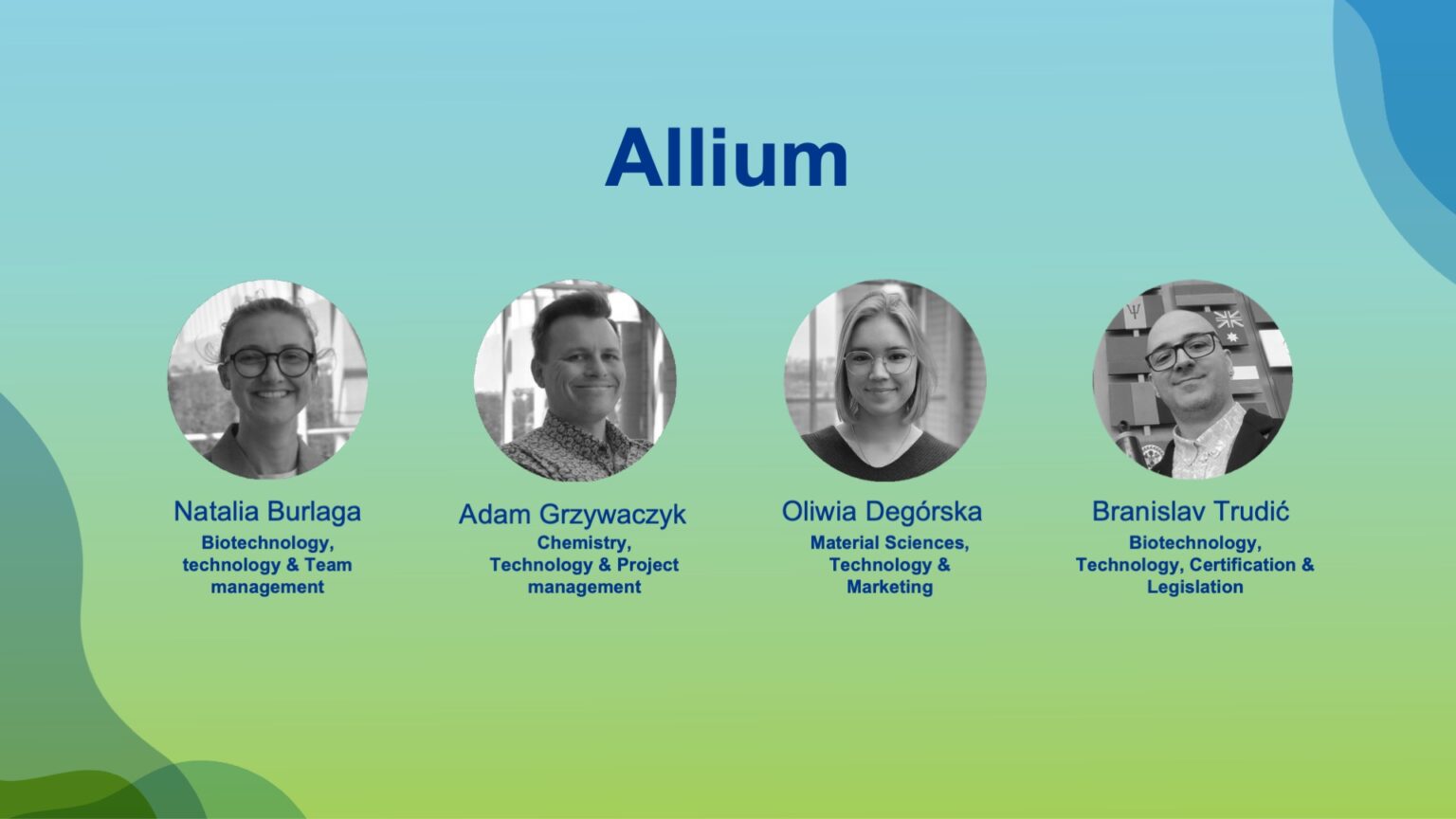
AquaSmart
Members: Franz Nemes, Nabil Chahda, Flor Escobar, Otilia Biro, Lawrence Carvalho and Sabina Bakula.
Challenge: Canary Islands are facing water scarcity and massive tourism. Our team suggests several measures for water conservation but the pilot consists of smart water meters installation and a monitoring app for tracking the consumption, detect leakages, monitor grey water recycling and smart irrigation systems.
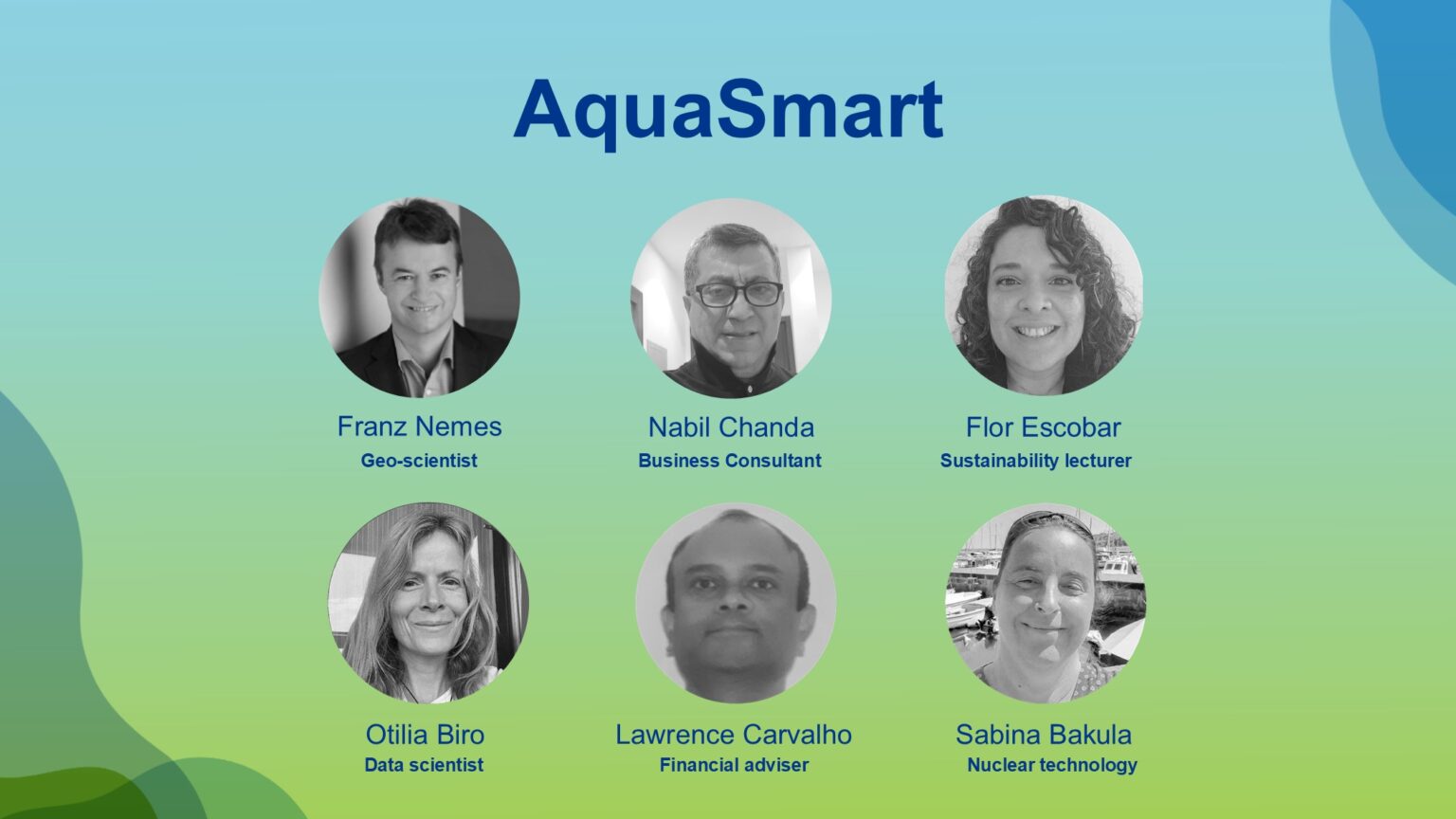
BEEnergy
Members: Muhammed Oğuzhan Mete, Muhammed Yahya Bıyık, Alp Eren Filiz and Zafer Talha Uşi.
Challenge: Building operations represent 28% of total global carbon emissions, contributing significantly to climate change. Urban settlement areas are projected to increase more than threefold and be responsible for over 75% of global carbon emissions by 2050. The goal of “Carbon Neutrality” is an essential global agenda to protect the earth and overcome the climate change crisis. It is vital to take strict actions to mitigate carbon emissions.
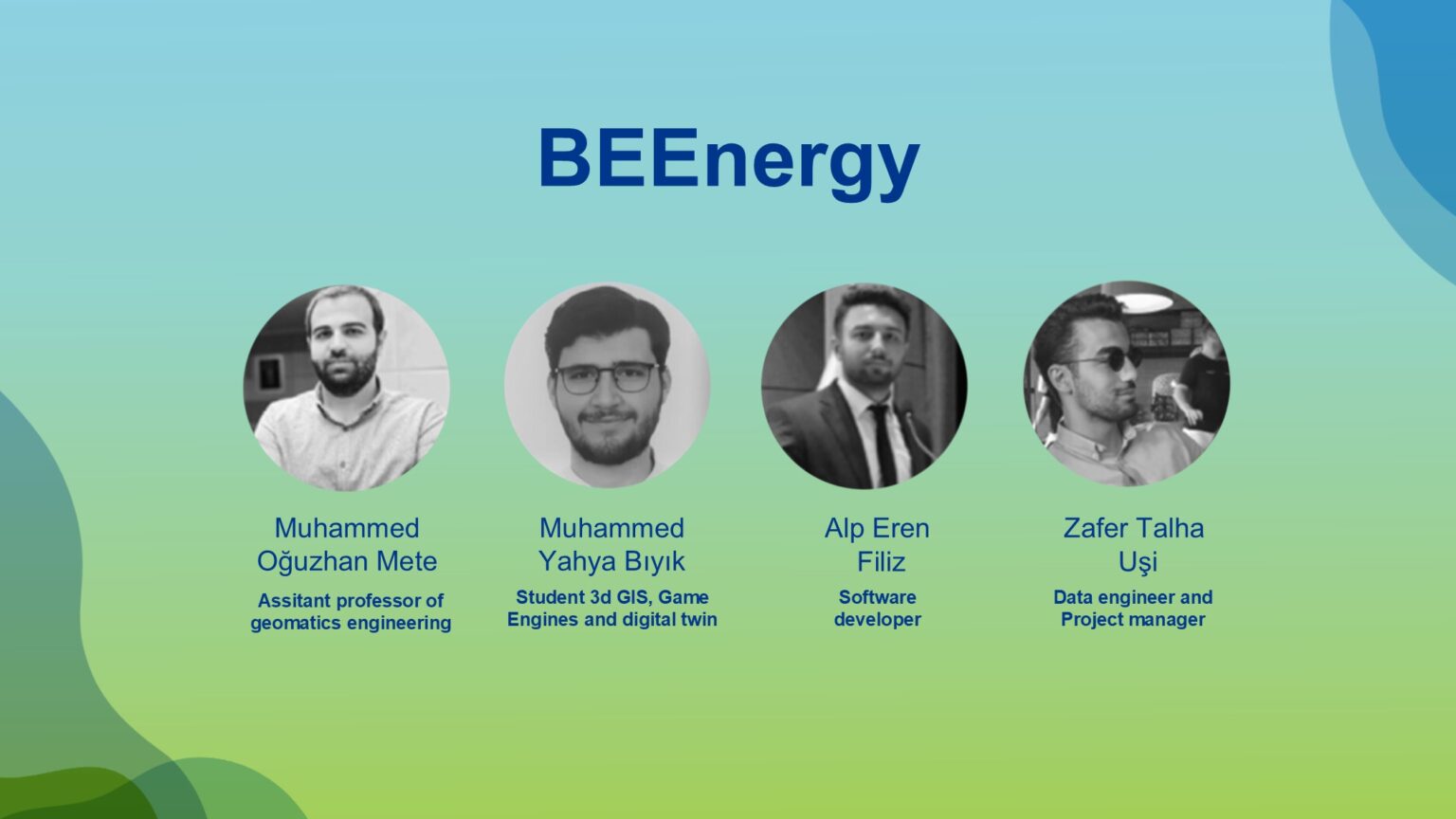
City Layers
Members: Domagoj Krhen, Lovro Koncar-Gamulin, Andrea Wiesinger, Angelos Chronis and Serjoscha Duering.
Challenge: Green urban development requires more info transferred between citizens & decision-makers.
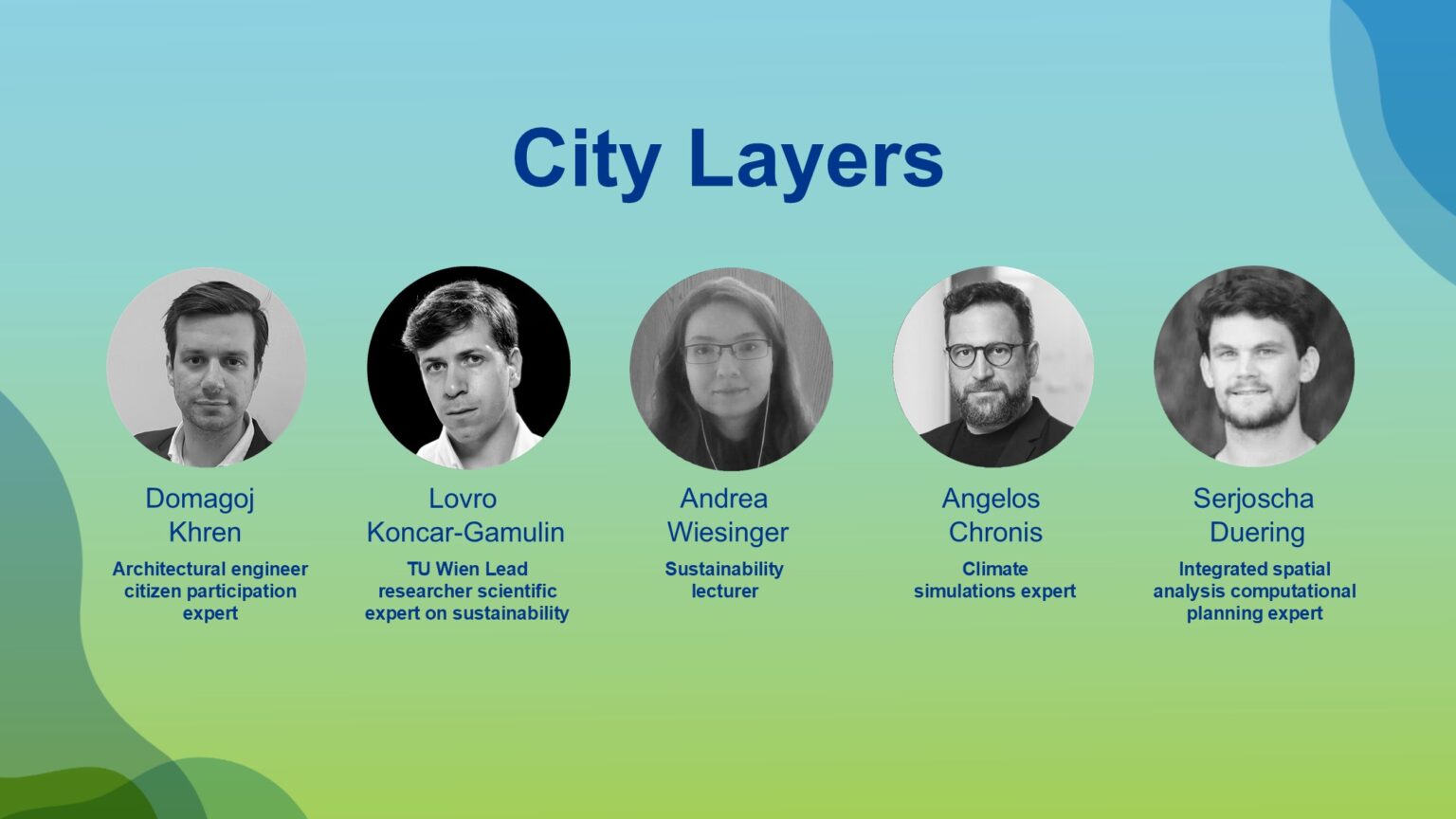
Cimate Risks’ Fighters
Members: Robert Zapciu, Alessio Beșleagă, Mihnea Ionescu, Radu Angelescu, Andreea Ciobanu, Andreea Zinca and Elena Răducanu.
Challenge: Our cities face escalating challenges related to climate, mobility, and pollution. Vulnerable communities, comprising 45% of the population, lack the tools to communicate their needs and access essential information to live healthy lives in dense urban areas.
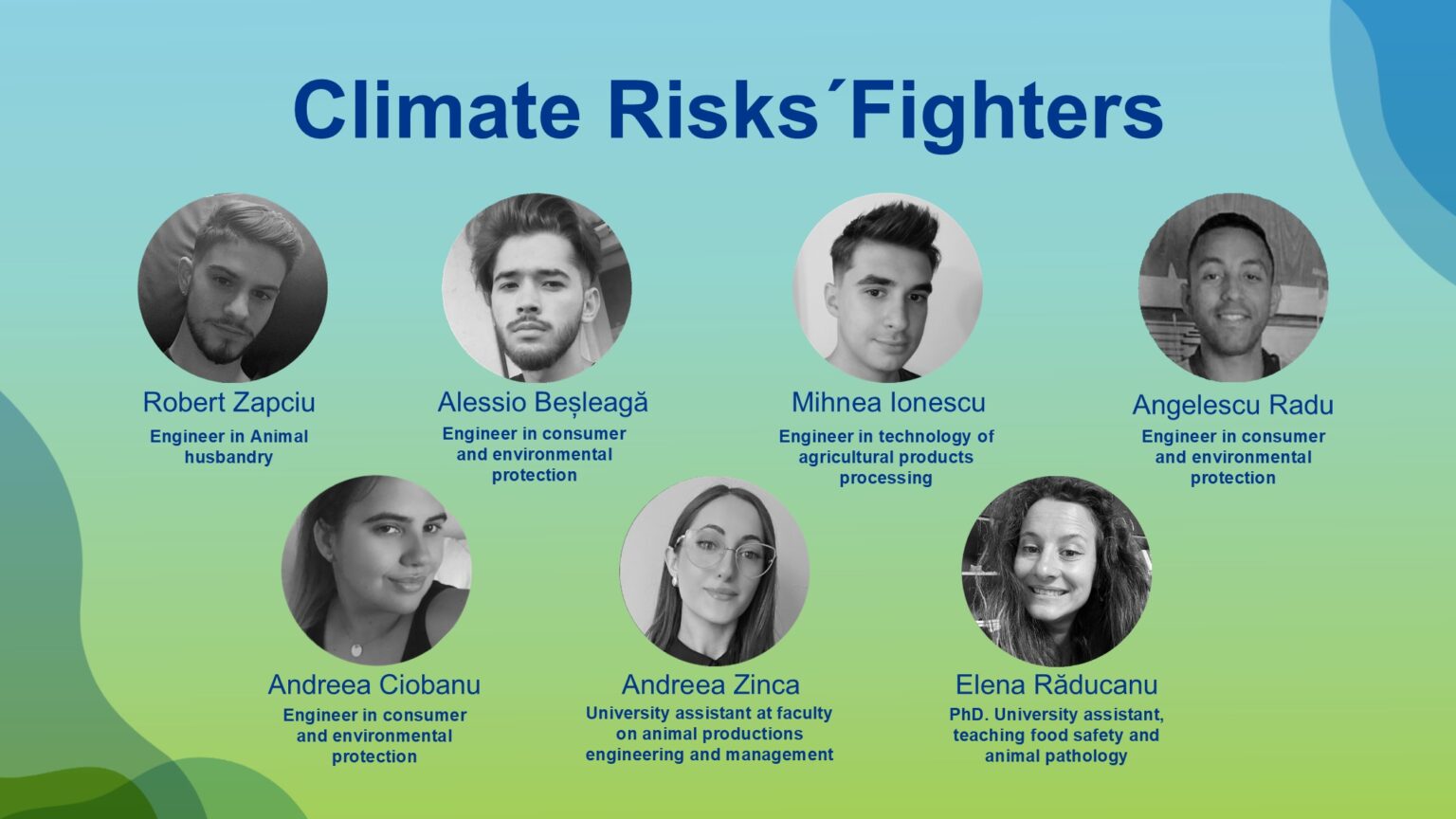
CoolShade Solutions
Members: Javier Rodríguez, Alicia Arranz, Zeliha Sahin Cagli, Emma Mouton, Esteban Ricardo García Clavel, A. Gülbin Kavak and Alexia Martin Ledezma.
Challenge: Southern Spain experienced over 8,000 heat-related deaths in 2023, and studies predict that this number could increase fivefold by 2100. How can we develop innovative cooling solutions to protect the elderly and urban residents from extreme heat while improving the livability of our cities?
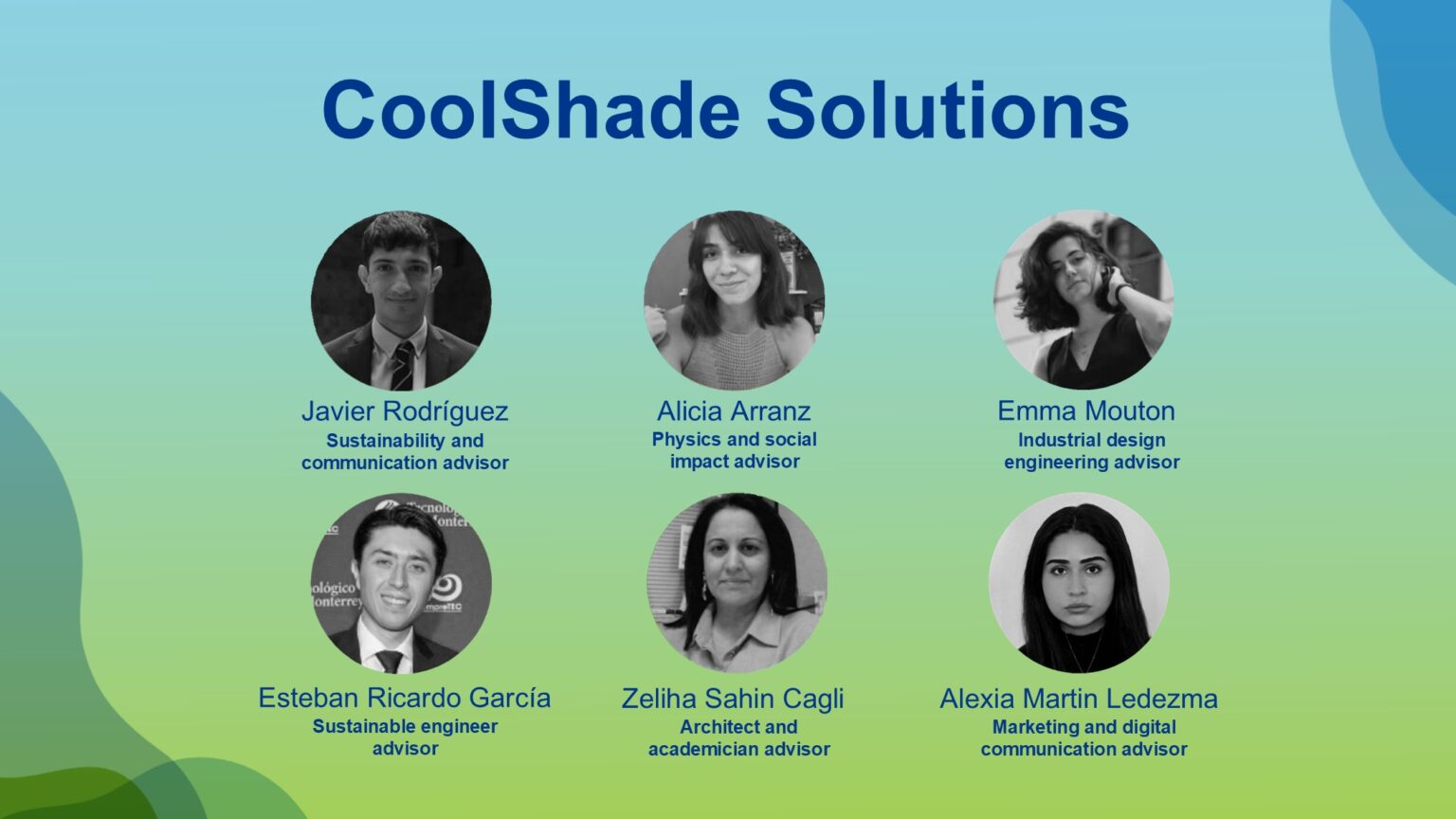
deICE
Members: Peteris Teodors Skrastins, Reinis Survila, Nikita Travins and Kristaps Grava.
Challenge: Due to a lack of standardization, batteries of micro mobility vehicles(e-bikes, e-scooters, etc.) aren’t being fully utilized during their lifetime and aren’t being recycled at the end of it.
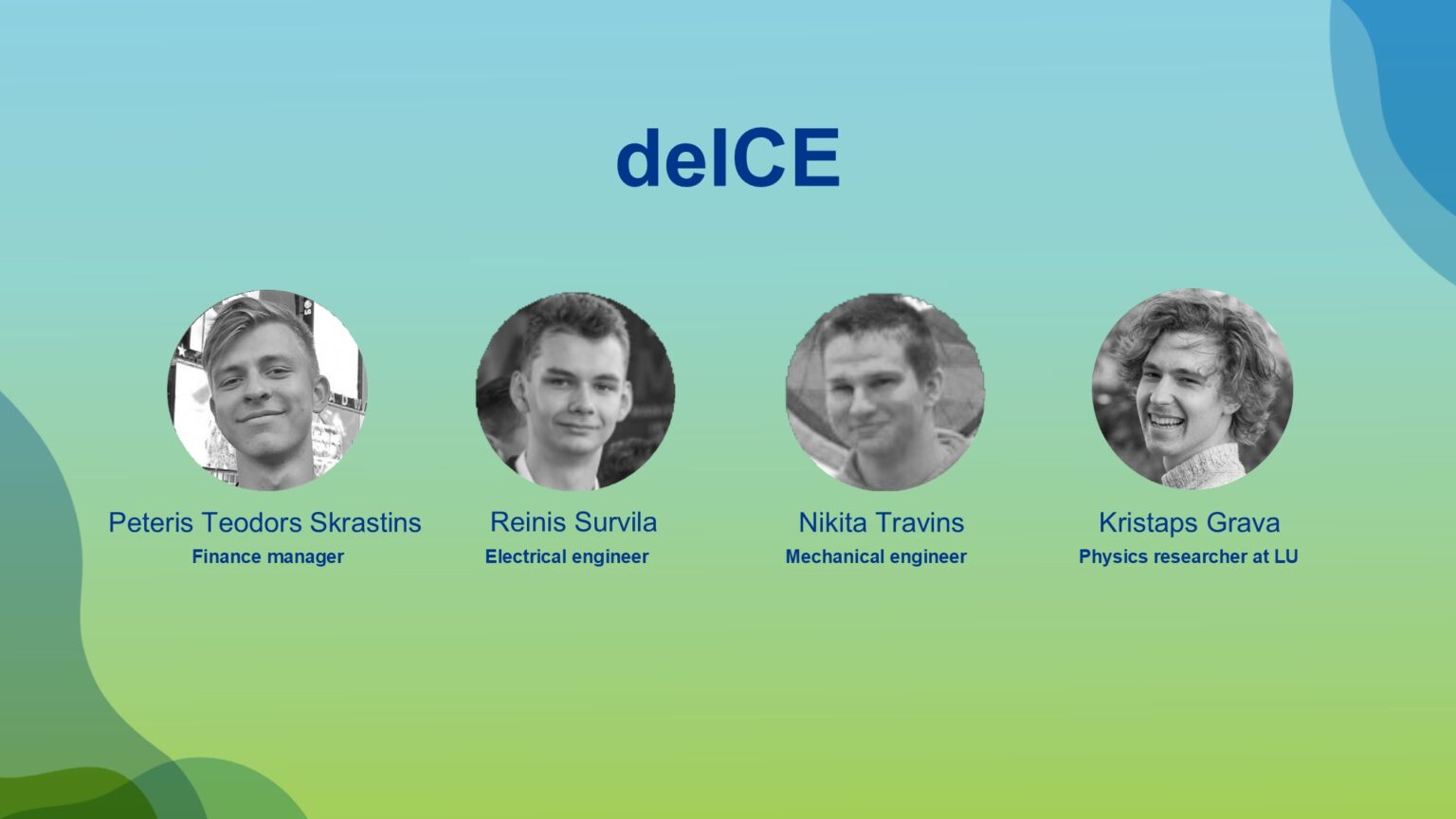
Eat Green
Members: Ance Sproge, Justīne Būce, Aiga Sorokina, Dāvis Grabovskis, Adrians Piliksers and Celine Huart.
Challenge: Poor dietary habits and lack of nutrition knowledge have led to rising obesity, food-related diseases, and environmental damage due to high resource use and greenhouse gas emissions. There’s also a disconnect between consumers and local farmers, resulting in high CO2 emissions from imported food while local farmers struggle to find customers.
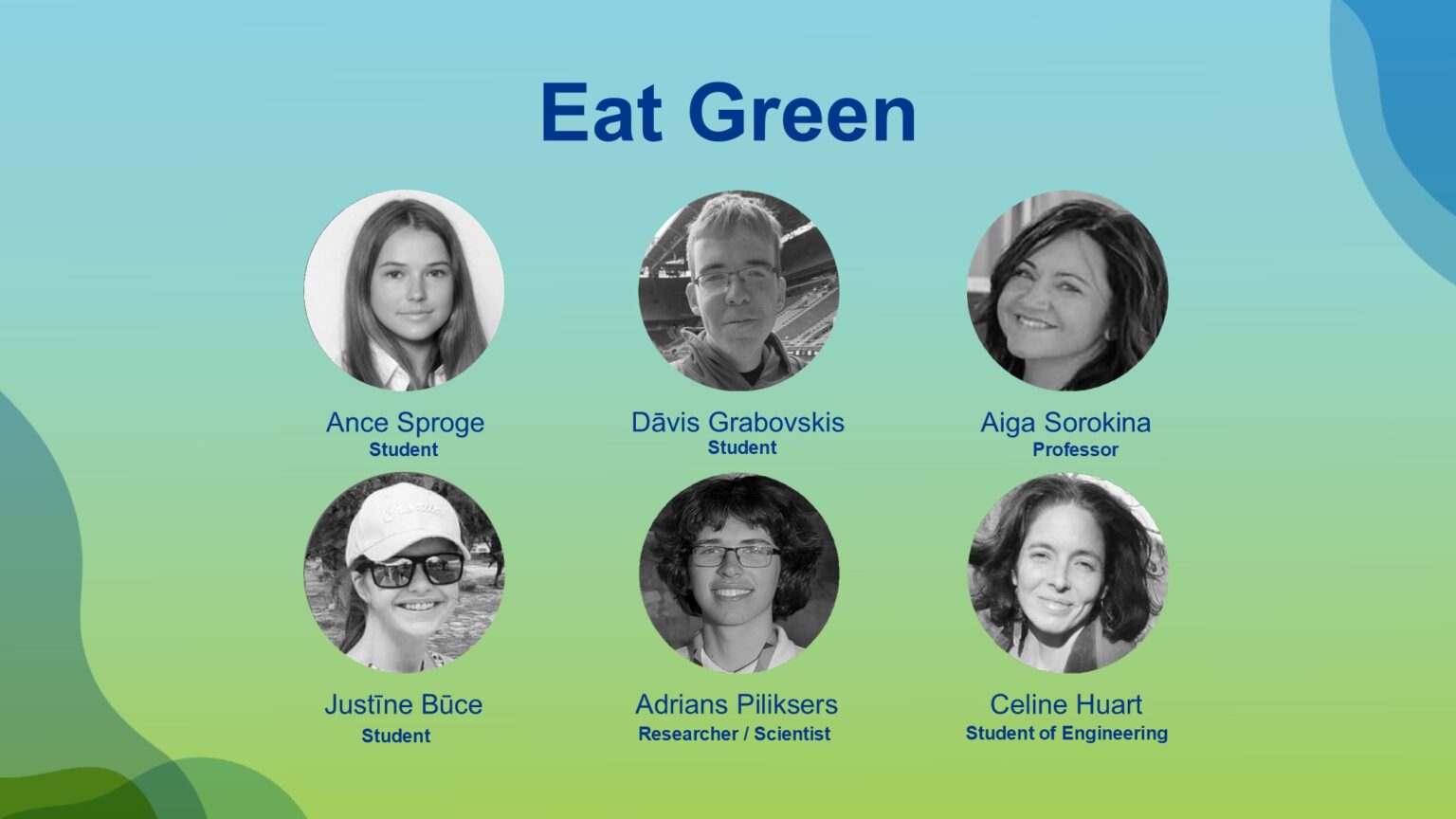
Eco Innovation Enthusiast
Members: Sedat Arıtürk, Mehmet Efe Göktürk, Berke Kıroğulları, Kaan Cem Çabuker, Prof. Dr. Ercan Ertürk and Assoc Prof. Mehmet Göktürk.
Challenge: Global warming and urbanization are taking their toll more and more. With increased city temperatures, existing energy based cooling solutions further increase overall city temperatures. Absorption due to irreflectivity and energy usage are major causes of so called “urban heat islands”.
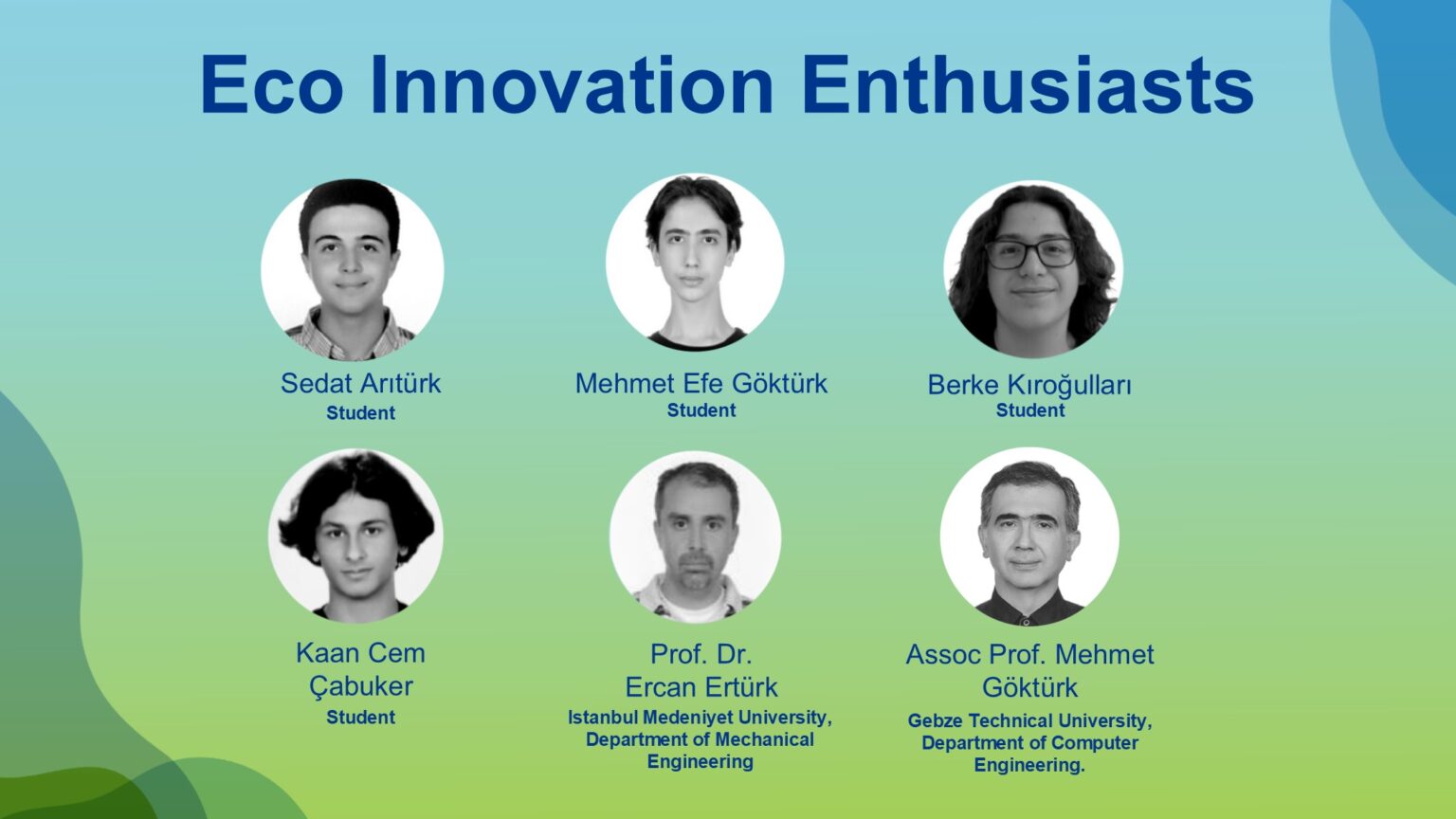
Ecoluverra
Members: Yehya Sharif, Tinhinane Smail, Loïc Bal, Ame Saleh Ali and Asma Bautroni.
Challenge: In 2021, France generated 2.2 million tonnes of plastic packaging waste, but only 27% was recycled (Eurostat). Communities need to address the negative impacts of plastic pollution to restore environmental quality and improve quality of life.
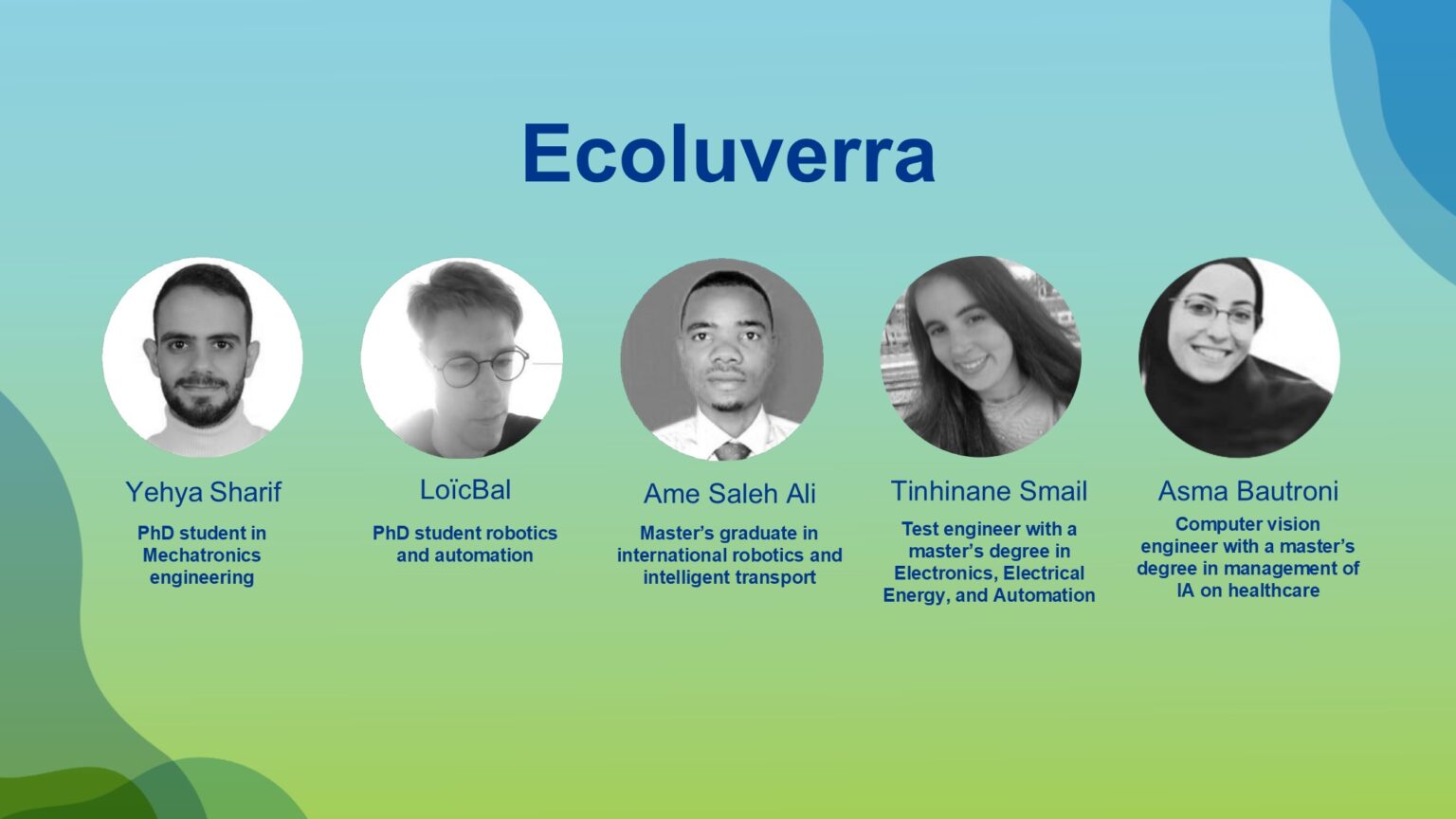
Food Rescuers
Members: Karolina Mikna, Orestas Nastulevičius, Kęstutis Bražinskas and Voicu Dragomir.
Challenge: Schools in Lithuania are wasting 12-20% of food. How might we help them leverage food waste to save finances and resources, with which students, teachers, and staff could get better, more nutritious food and make a smaller CO2 footprint? About this food waste problem in schools, many people don’t even know and awareness needs to be spread.
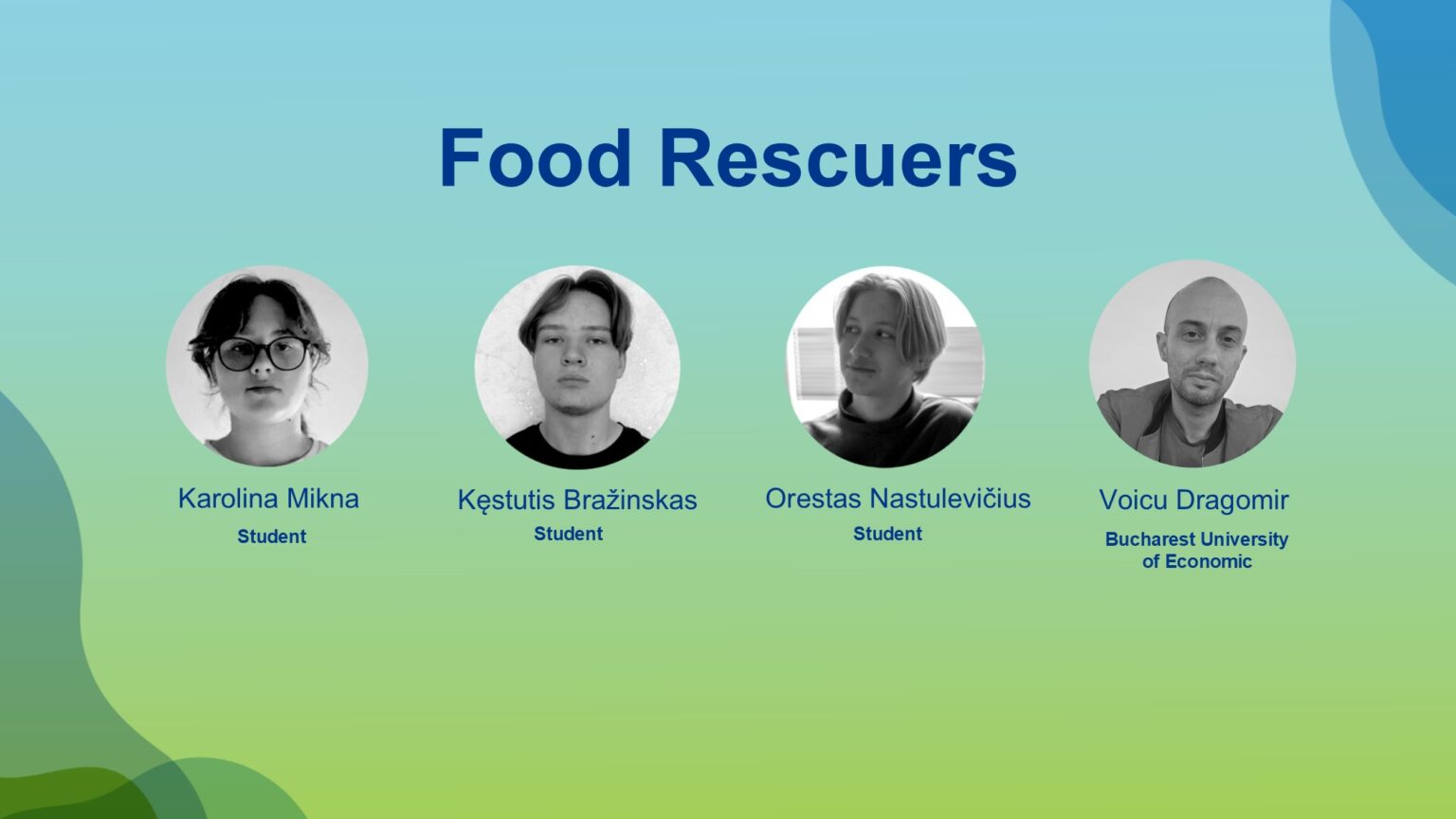
Green Cool Innovators
Members: Mohamed Alsawad, Abdelrahman Enan, Mohamed Eita and Mohamed Farrag.
Challenge: The share of households using air conditioning has grown to 19 percent in 2024 compared to 13 percent the previous year. How might we smart grid for domestic heating and cooling decrease electricity consumption and CO2 emissions?
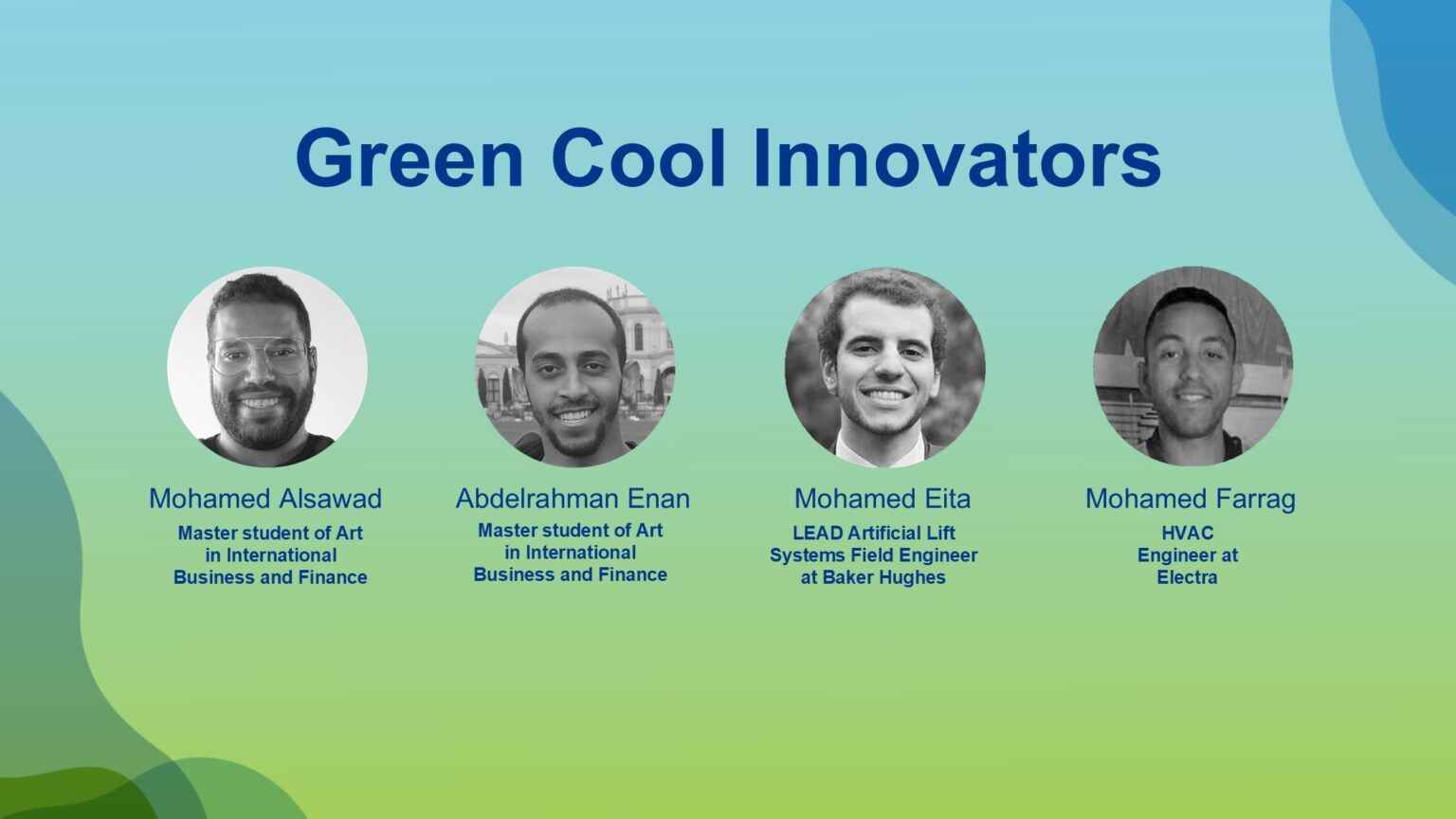
Green Team
Members: Elias Ibnoussina, Lou Devos, Jacqueline Gabel, Petr Musil, Professor Vasilis Kanakoudis and Dr. Rohat Gültekin.
Challenge: Belgium’s agricultural sector faces severe water scarcity, with 46% of water resources consumed by agriculture. Despite 200 days of rain per year, 50% of Belgian land experiences drought in summer.
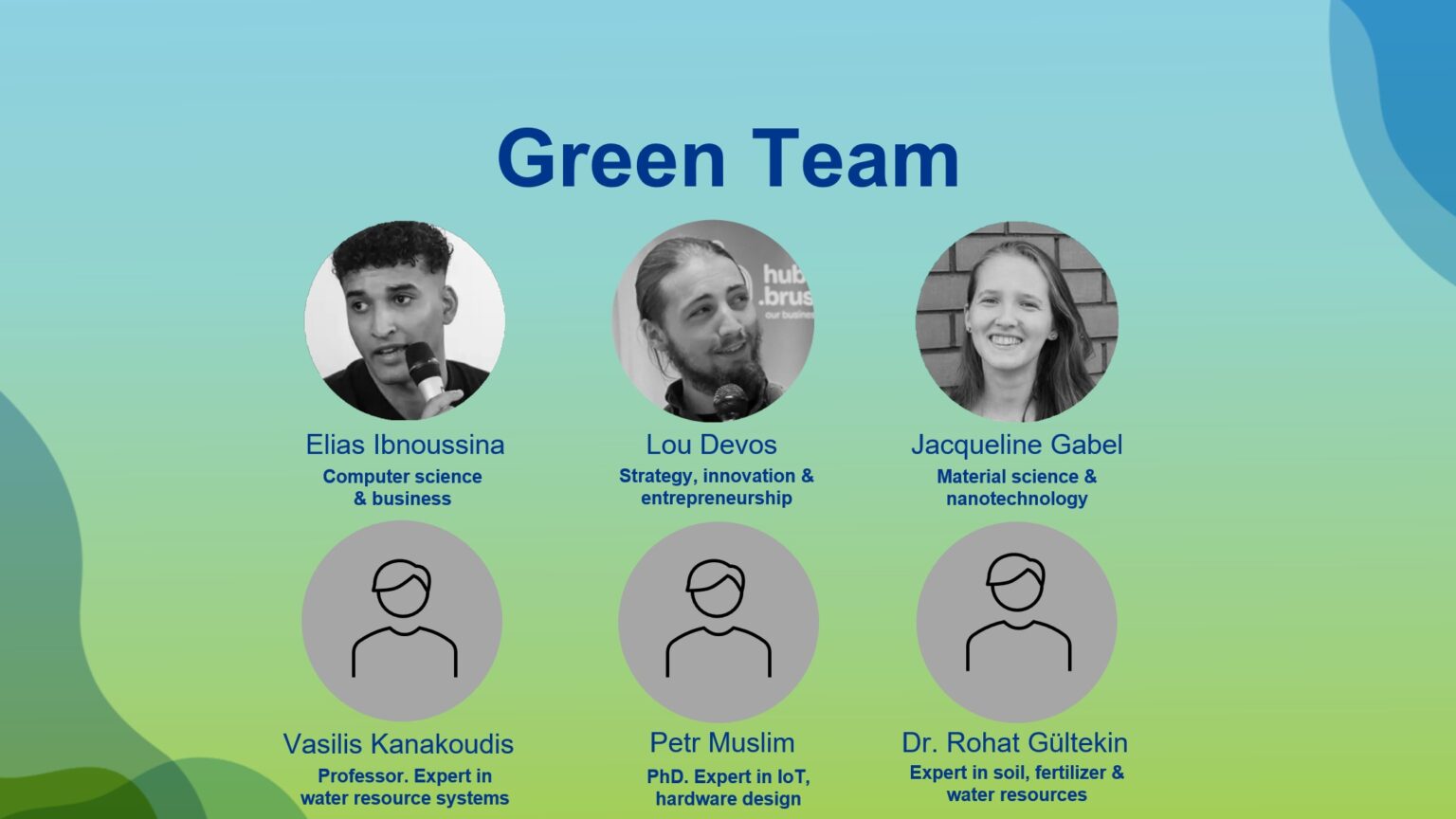
Heat Busters
Members: Nick Vella Muskat, Musawar Ahmad, Berilsu Öner, Maja Silvestri, Elyne Kodjo and Fatih Özcan.
Challenge: Urban areas face severe heat waves, increasing public health risks and energy costs.
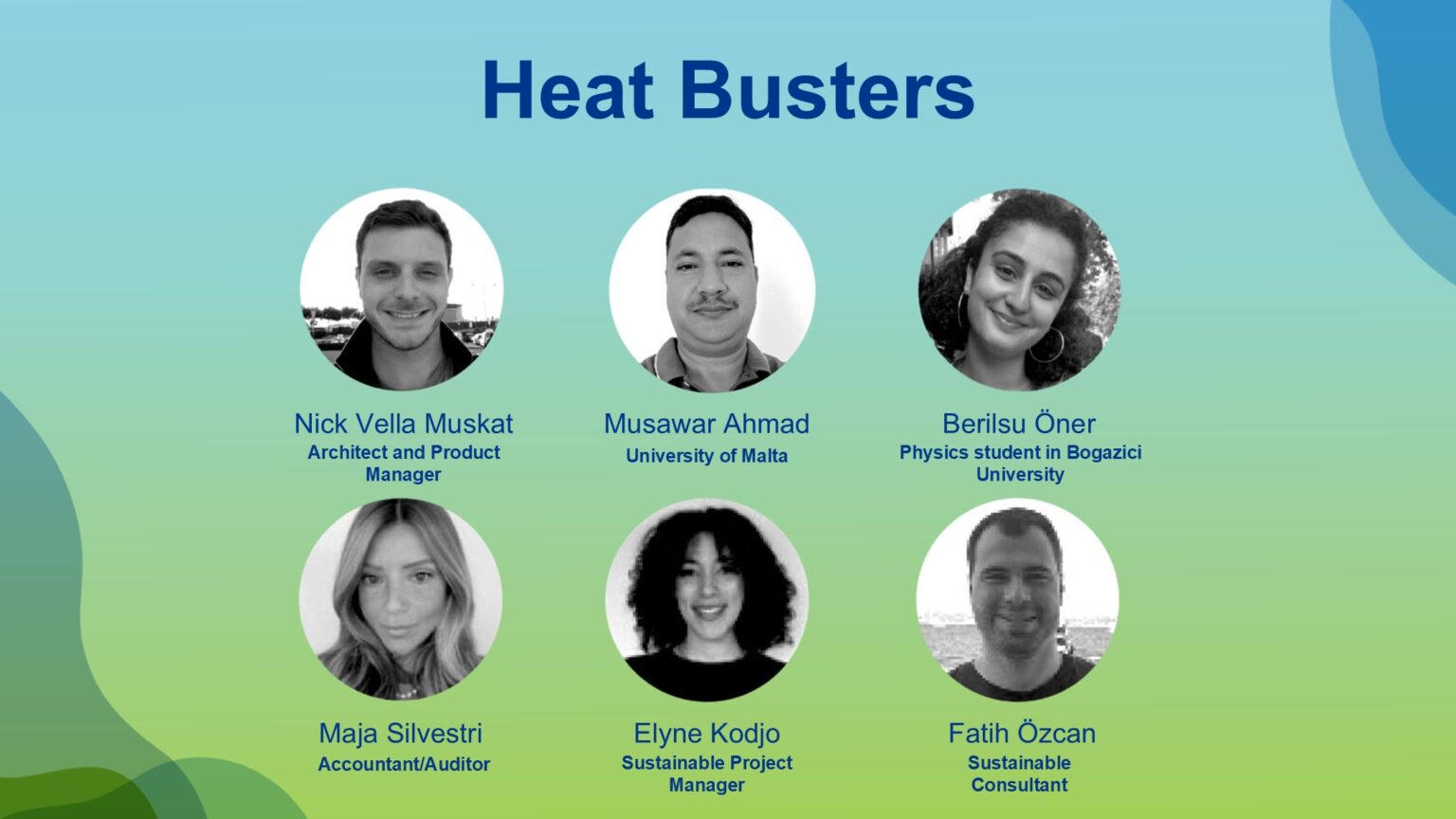
Heat Fighters
Members: Panagiotis Petropoulos, Panagiota Stamatelopoulou, Nikolaos Zapantiotis and Ippokratis Tsevrenis.
Challenge: Greece has been the country with the highest heat-related mortality per million of inhabitants across 35 european countries in 2023. How can we deploy cost-effective nature-based solutions to contribute to the adaptation of the city of Athens to the amplifying effects of the Urban Heat Island in light of the climate crisis, and address energy poverty issues for the most vulnerable households?
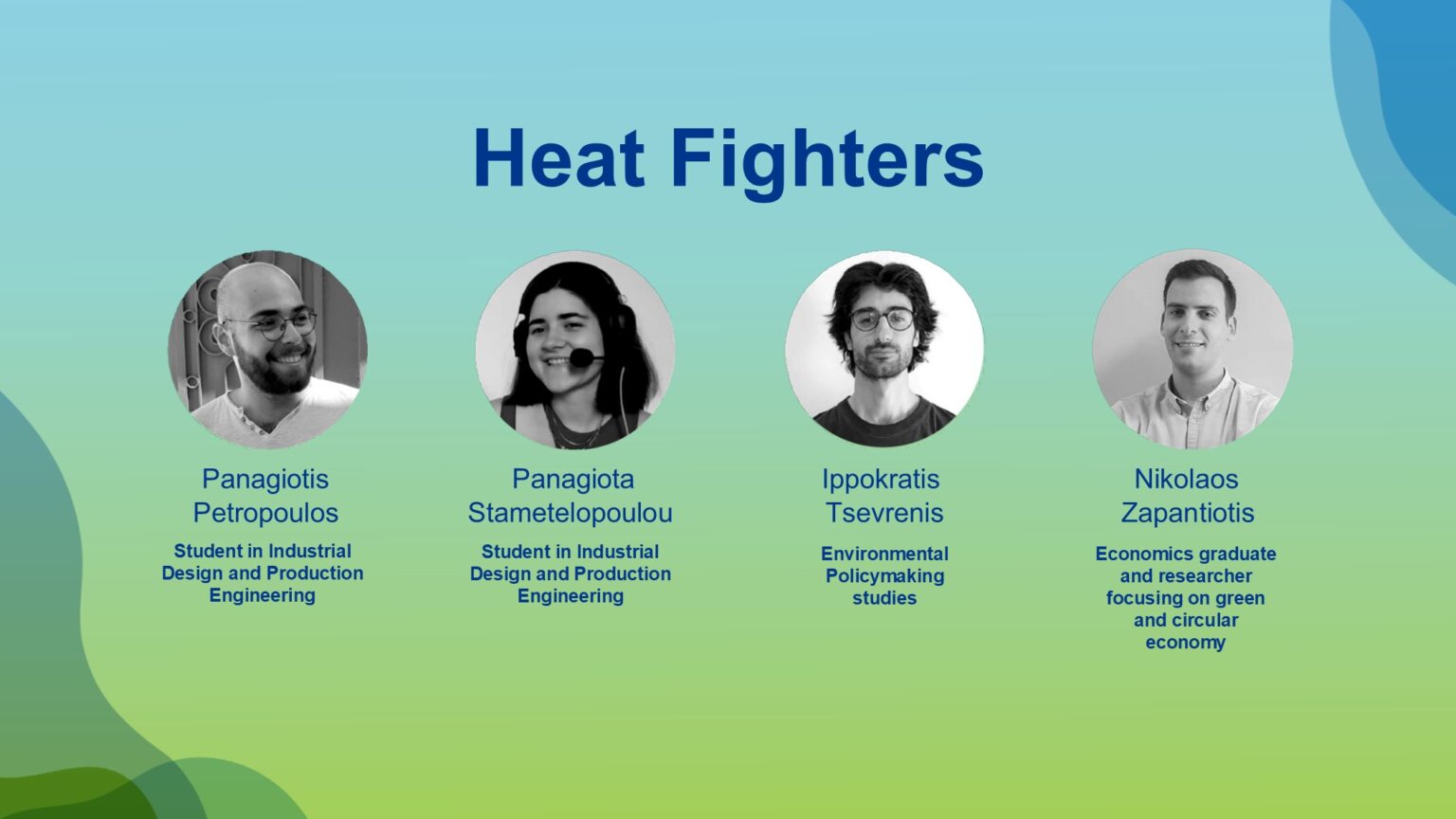
HempSustain Builders
Members: Evelyn Calispa, Anișoara Neis, Irem Ustuntay, Zaher Akkad and Ismaila Kuburah.
Challenge: The building industry accounts for 40% of global greenhouse gas emissions. Despite a $1.34 trillion market size by 2024, only 3% is for bio-based materials. This contrast highlights an urgent opportunity to adopt carbon negative materials like industrial hemp. How can we take a step towards reducing the CO2 in our communities and building an effective network for industrial hemp?
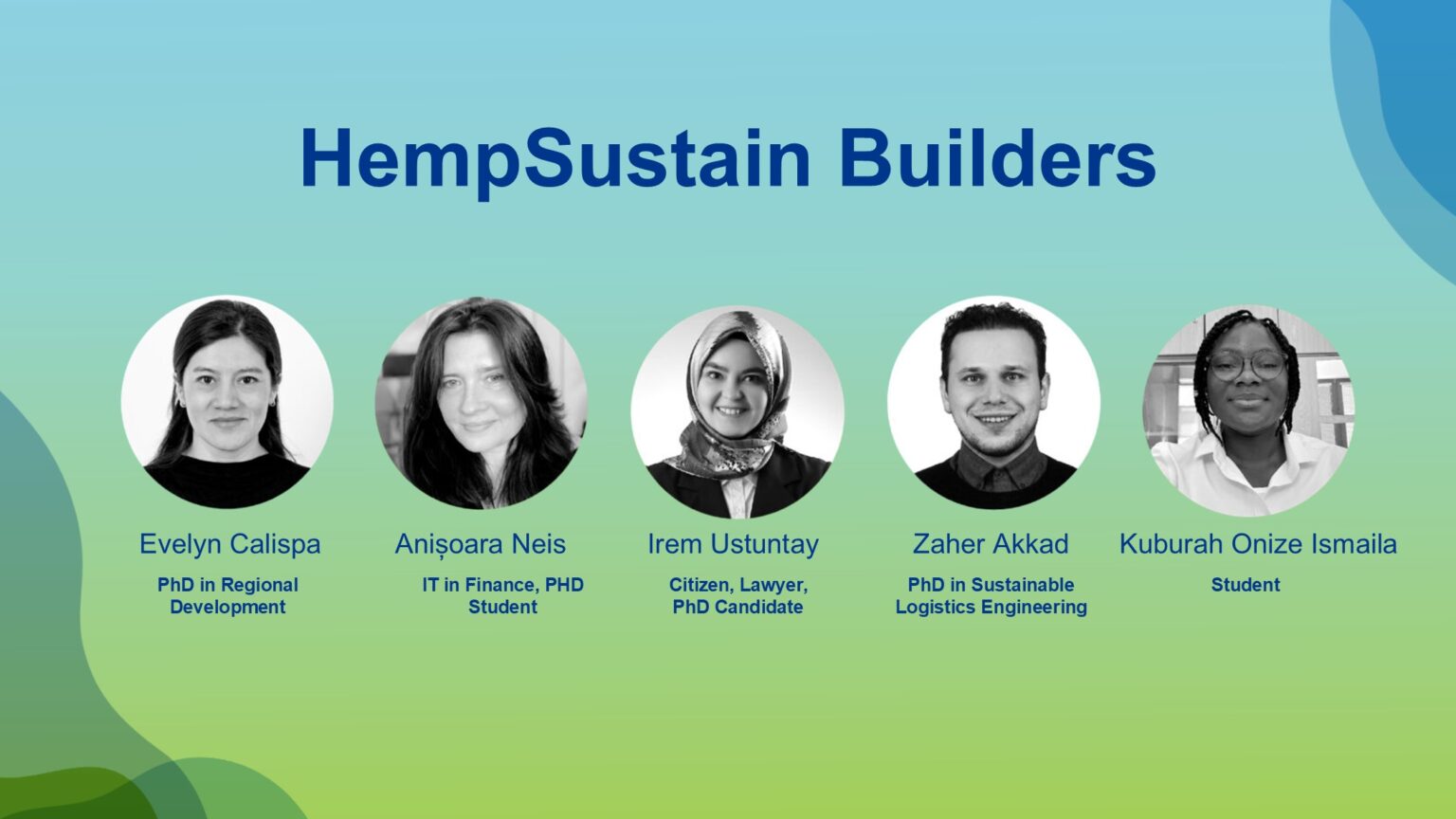
Hydro-Cycle
Members: Zusia Meissner, Alexandra Groszek, Agnieszka Szostok, Ala Seralafin, Michał Kurczak, David McKechnie and Jakub Kulesza.
Challenge: Agricultural producers need a community wastewater management system to provide clean local water and energy supply.
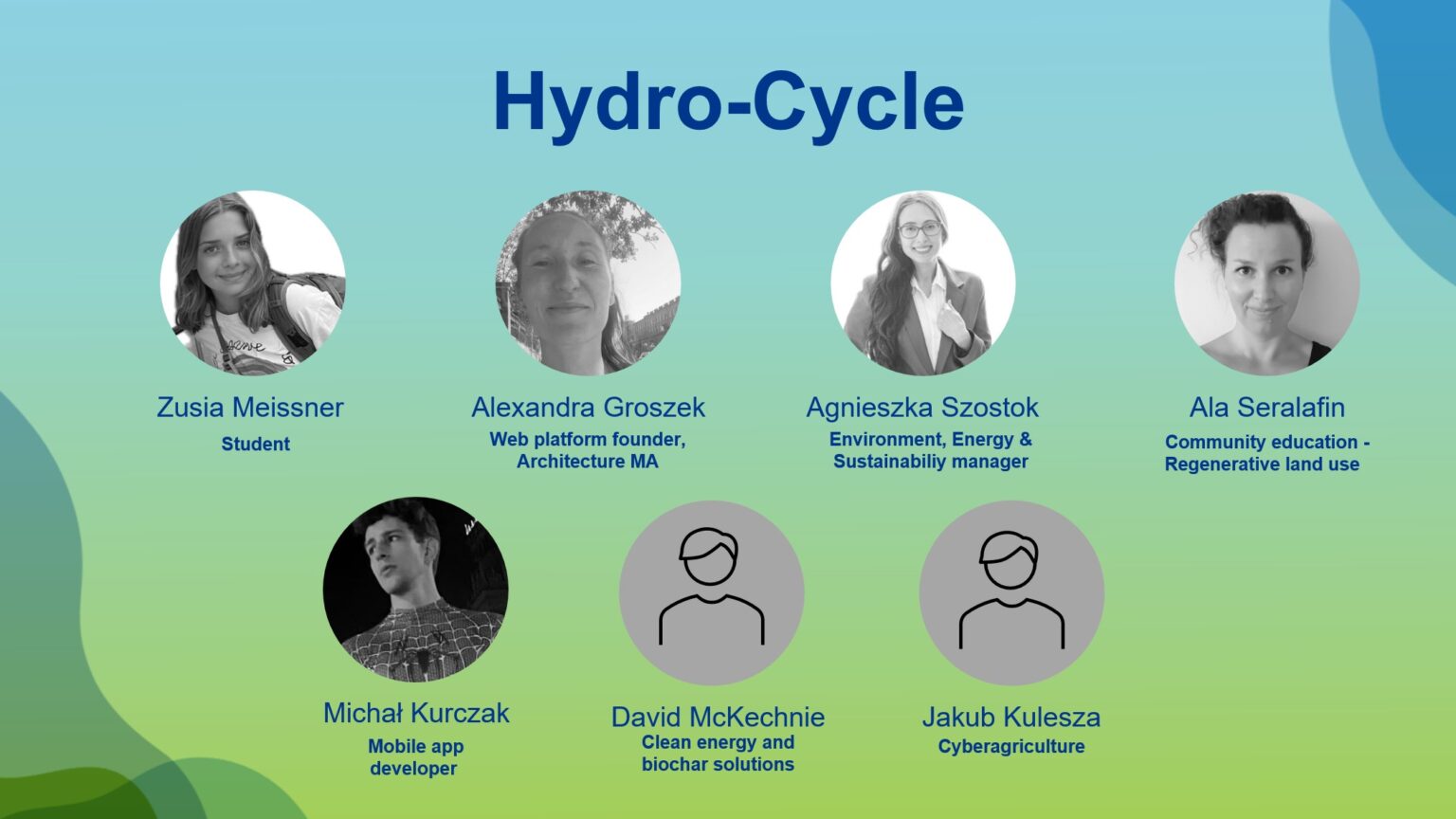
Lagom
Members: Champike Munasinghe, Anna Karapetyan, Liliana Filip, Svitlana Baliul and Nicole Chidiac.
Challenge: Schools contribute significantly to food waste, impacting sustainability.
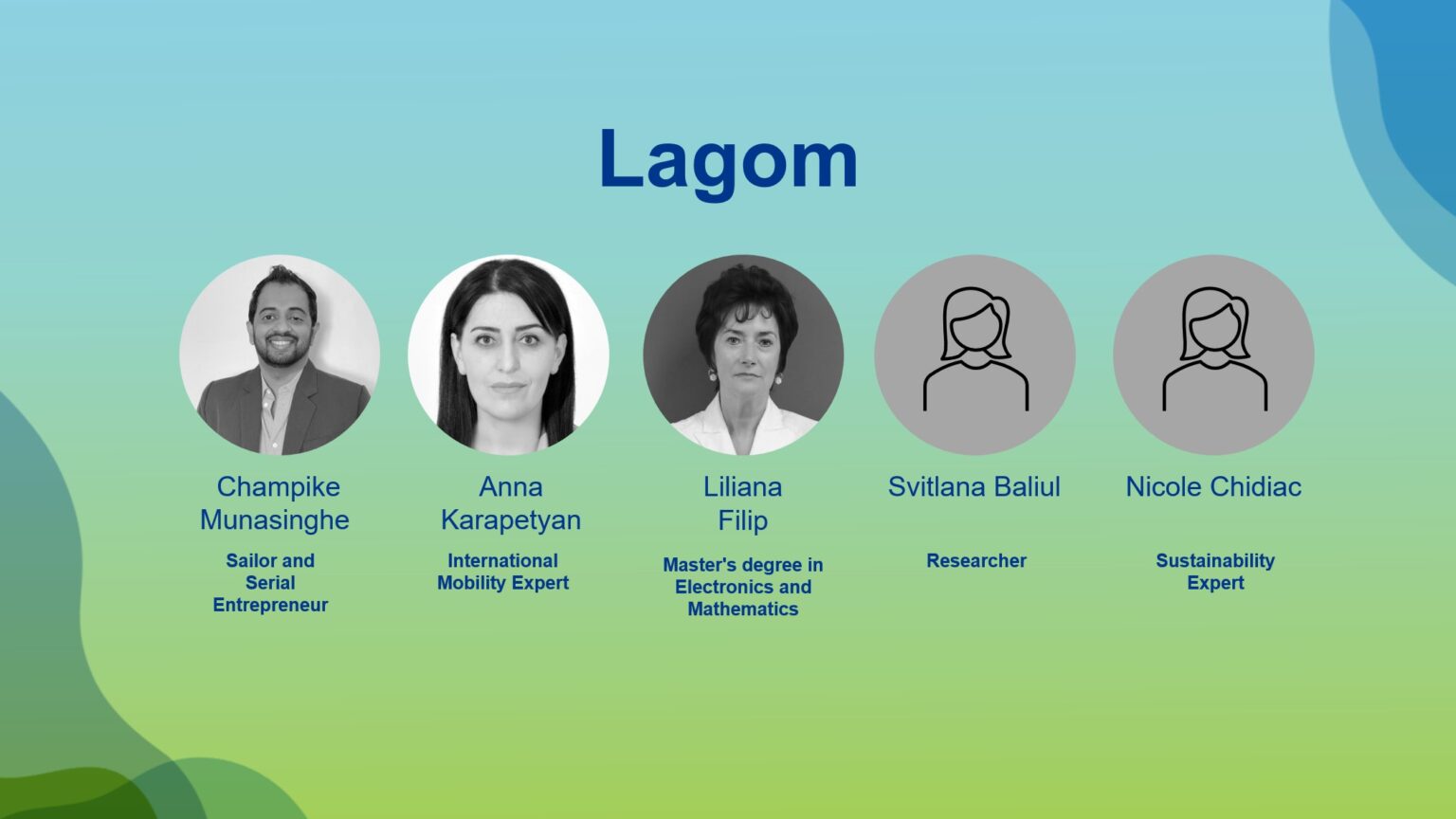
Pesticide Buster
Members: Alina Radu, Hadia Yaseen, Kitti Králl and Bintang Alam Semesta.
Challenge: From WHO, there are over 3 million poisonings and 220,000 deaths each year. On top of that, our survey results are 8 out of 10 respondents are concerned with the pesticide in food. On top of that, 96.4% more likely inclined to purchase the test paper and test it at home. Then, how do we develop practical solution kit to detect to the chemical residual level on foods so that we could ease serious health hazards as well as ensure food safety for common people?
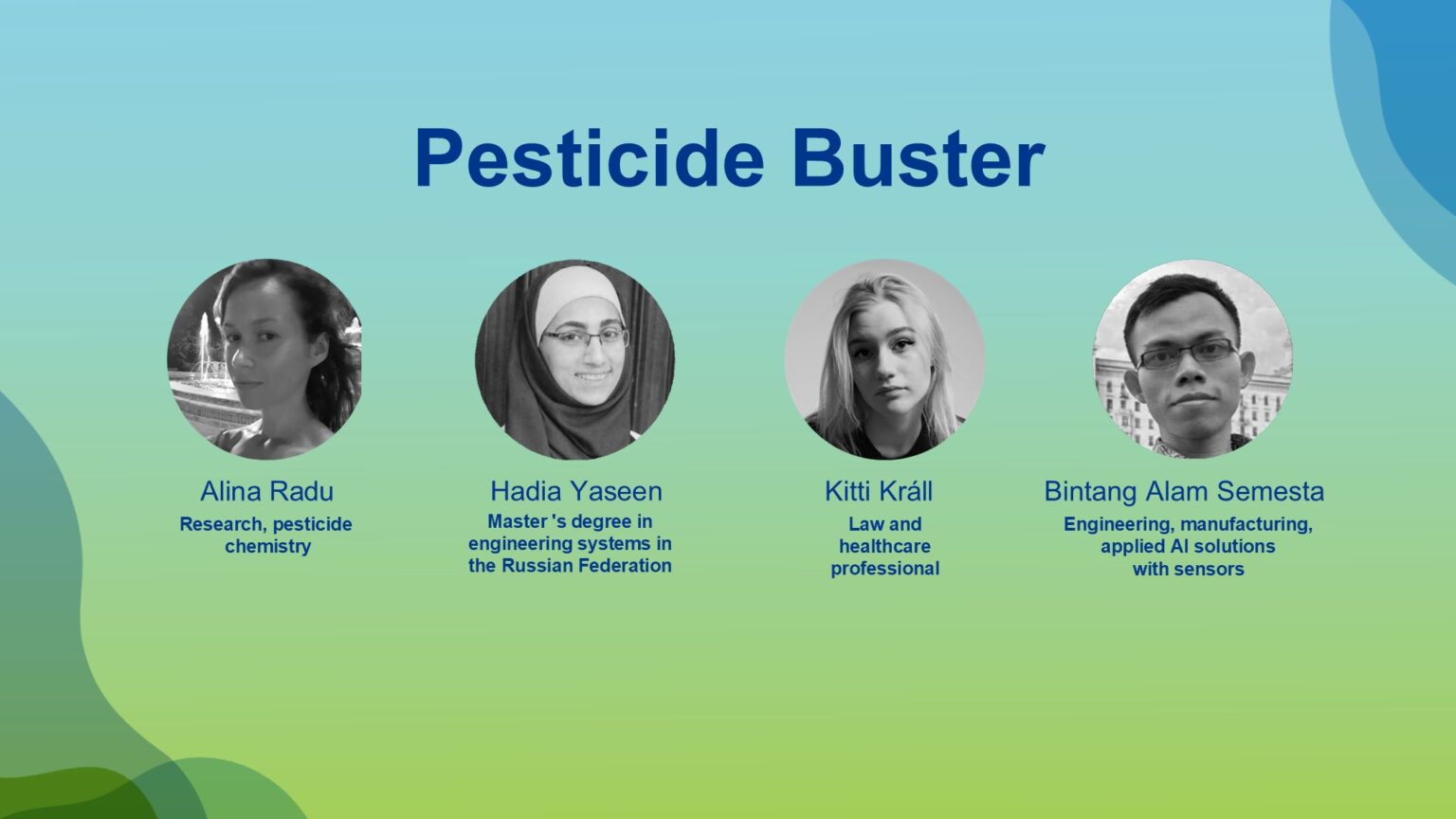
Plimira
Members: David Klepej, Petros Lourikas, Barbara Kostanjšek and Maja Debevec.
Challenge: Our cities are facing increasing heavy rains and floods, causing large damages, casualties, and costs to the built environment. Between 1980 and 2020, floods have caused over 250 billion euros of financial losses (roughly half of all climates related economic losses) and almost 5000 fatalities in Europe alone (EEA, 2023). Especially in cities, floods affect people’s lives and cause high costs for insurance companies, cities, countries, and the European Union. How can we help the citizens, companies, and local authorities, to better prepare for these events and to minimise damages and fatalities due to heavy rains and floods?
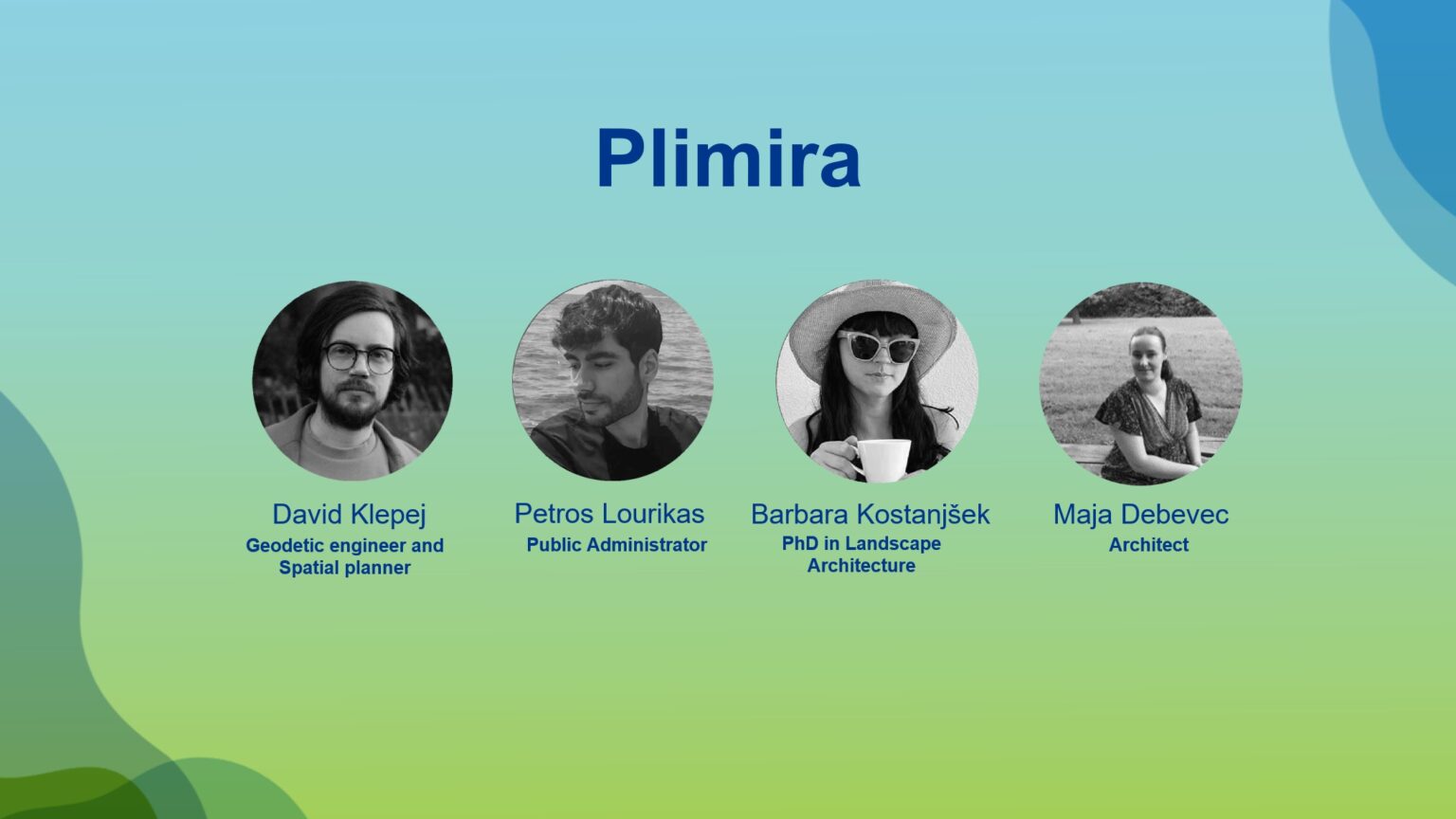
PolycycleHomes
Members: Valeria Pramatarova, PhD Vilyana Ruseva, Nia Obretenova, Niya Slavova and Sofia Sajko
Challenge: Only 9% of all the plastic waste generated globally is recycled. What do we do to make that number go up?
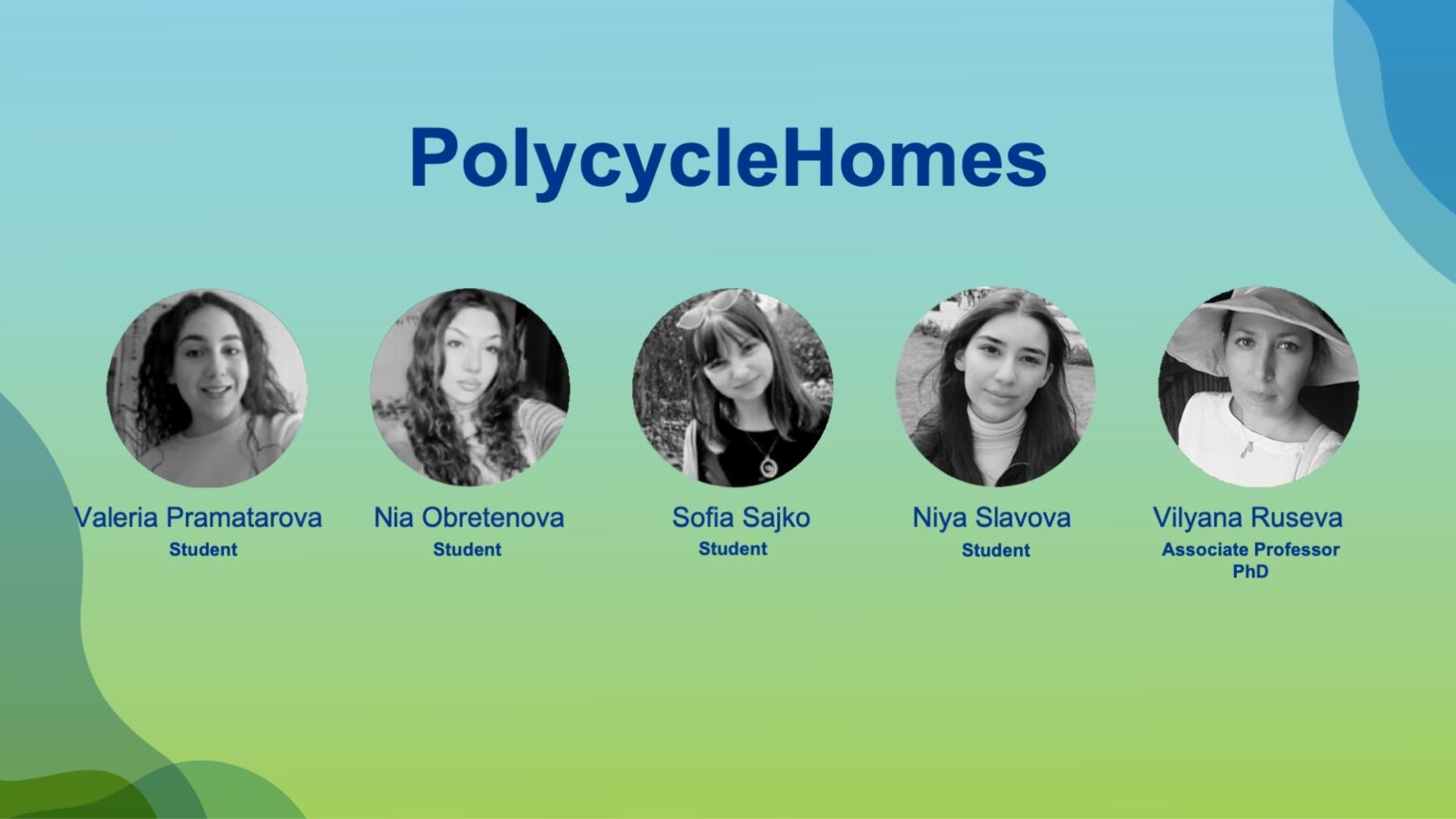
Smog Busters Alliance
Members: Nabilatul Husna Zulkifli, Nurul Nabilah, Milen Baltov and Muhammad Ilham Nazmi Bin Azahar
Challenge: Improving air quality and increasing job opportunities in Bulgaria.
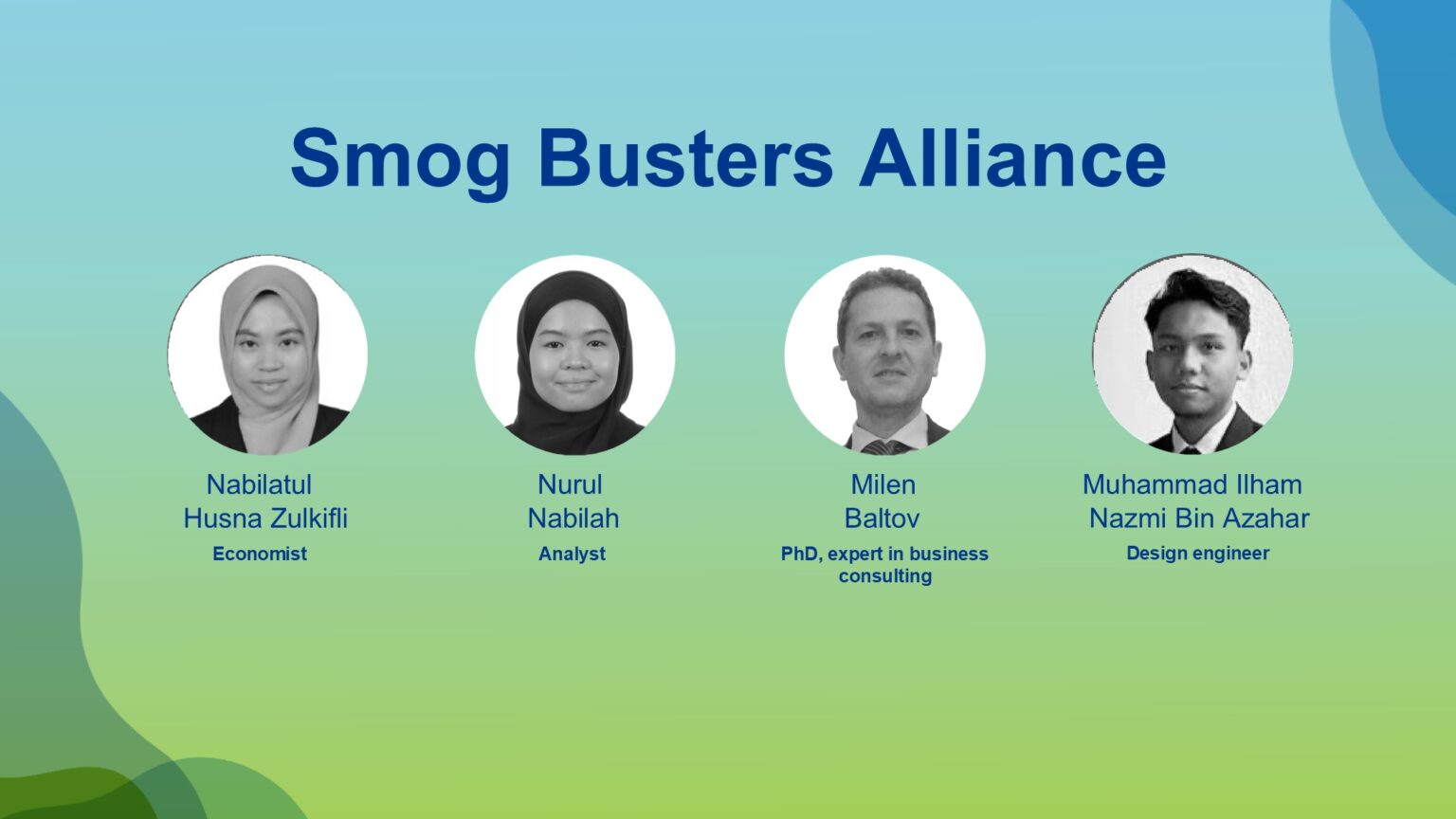
The Nettuniani
Members: Nick Vuolo, Gustavo Chiquín, Monica Salvia, Carlien Donkor and Agnese Bavuso Marone.
Challenge: Urban areas in Italy’s regions are increasingly vulnerable to floods due to climate change. From 2013 to 2019, Lombardy faced €422.9 million in flood damages, with Milan enterprises losing €8 million annually. What flood adaptation solution can protect businesses, infrastructure, mobility, and citizens while preserving environmental health in Milan?
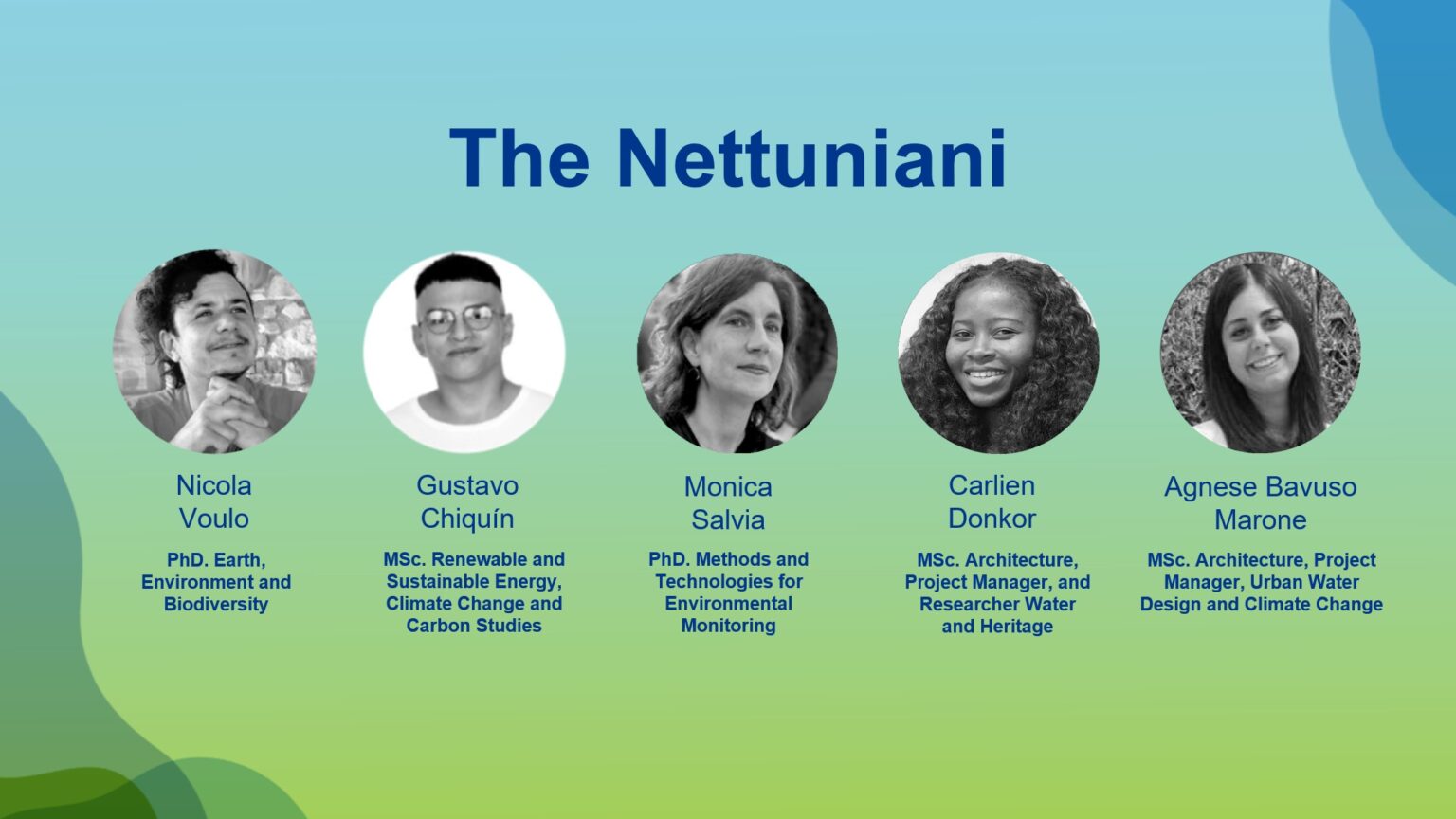
ToysAreGreen
Members: Pablo Maldonado, Rodrigo Sangil, Carlos Casanova and Yi Ze Chen.
Challenge: Empowering citizens with efficient consumption models in the Spanish region
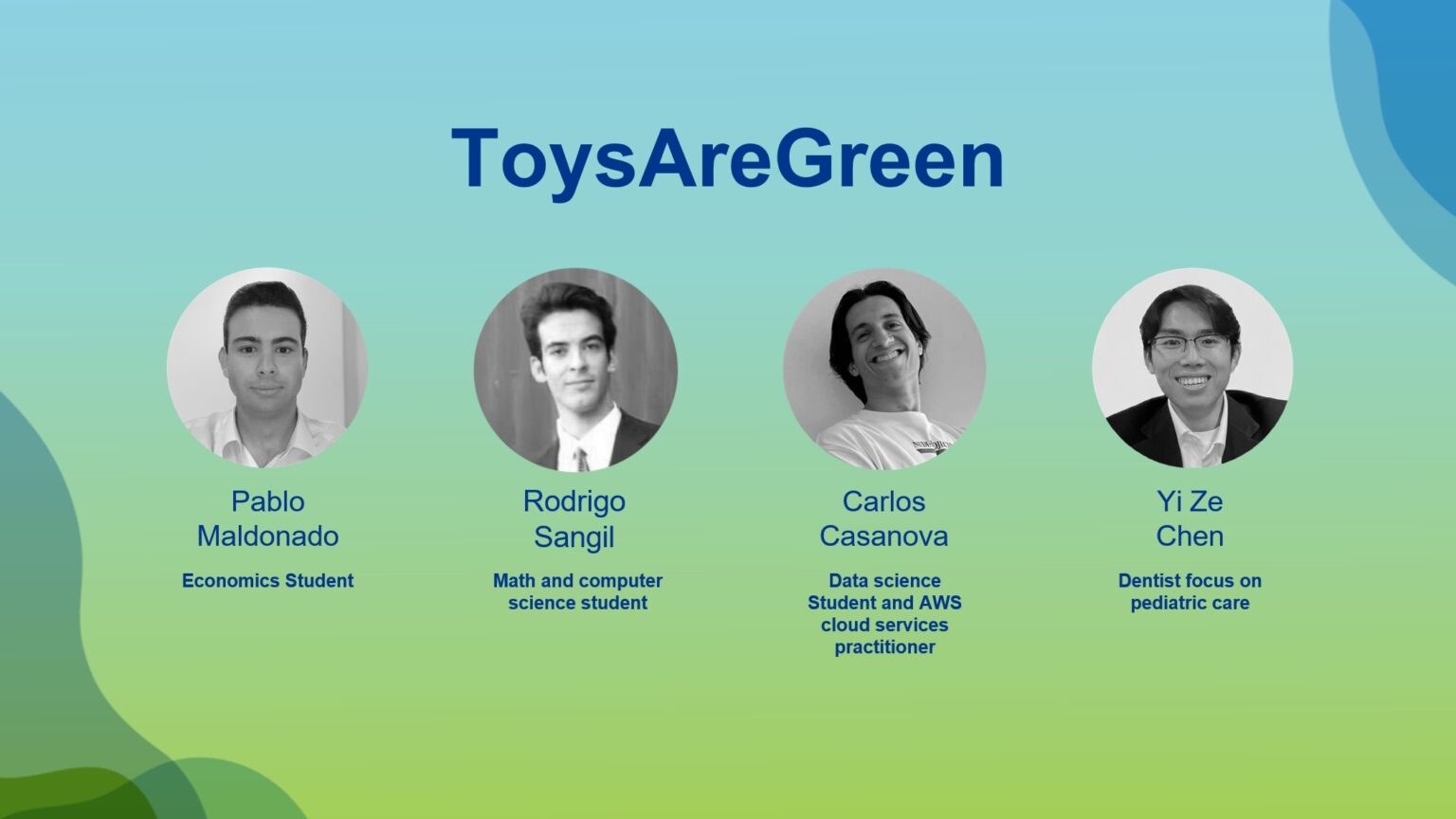
Veles Solutions
Members: Luka Cavaliere Lokas, Frano Rihter, Vlaho Biličić and Albert Rexhepaj.
Challenge: Floods occurring due to inadequate drainage systems and weak plans for mitigation. This problem ranges from minor disruptions to devastating disasters. Floods cause more than €6,250 billion losses in the EU and almost 140 lives are lost annually. Our goal is to build a machine learning model that is flexible enough to provide adequate solution for every form of flooding.
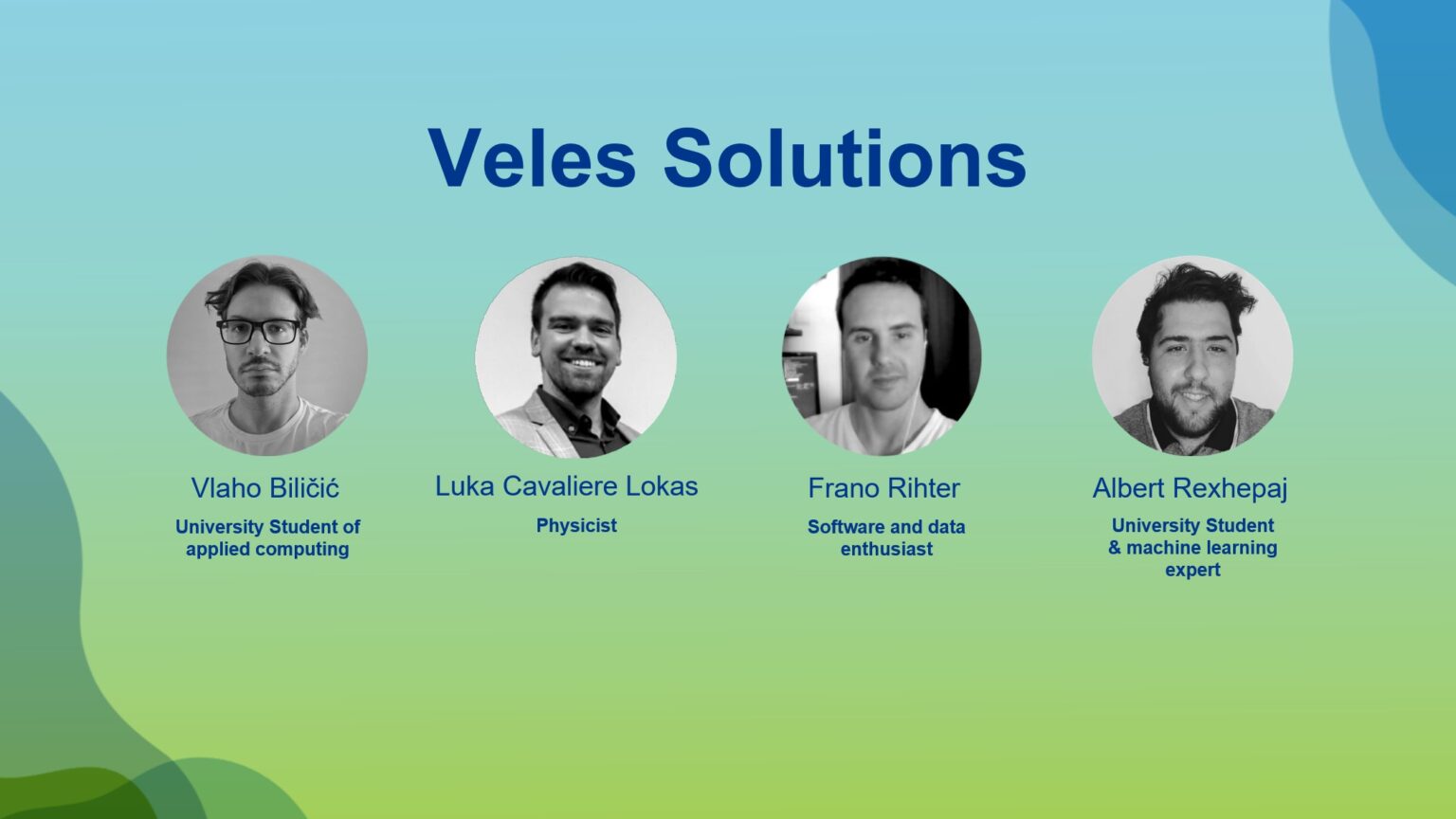
Vertifarm
Members: Ray Kong, Chin Kiat “Vincent” Pang, Kim Lindfors and Pallav Shrestha.
Challenge: World Population is growing, increasing the food demand; while arable land is decreasing, increasing the need for more land to be converted to farmlands to sustain the population. Modern farming technique, i.e. vertical farming can make efficient use of land. But vertical farming is expensive to setup and knowledge is lacking. How can we make vertical farming accessible to average citizen?
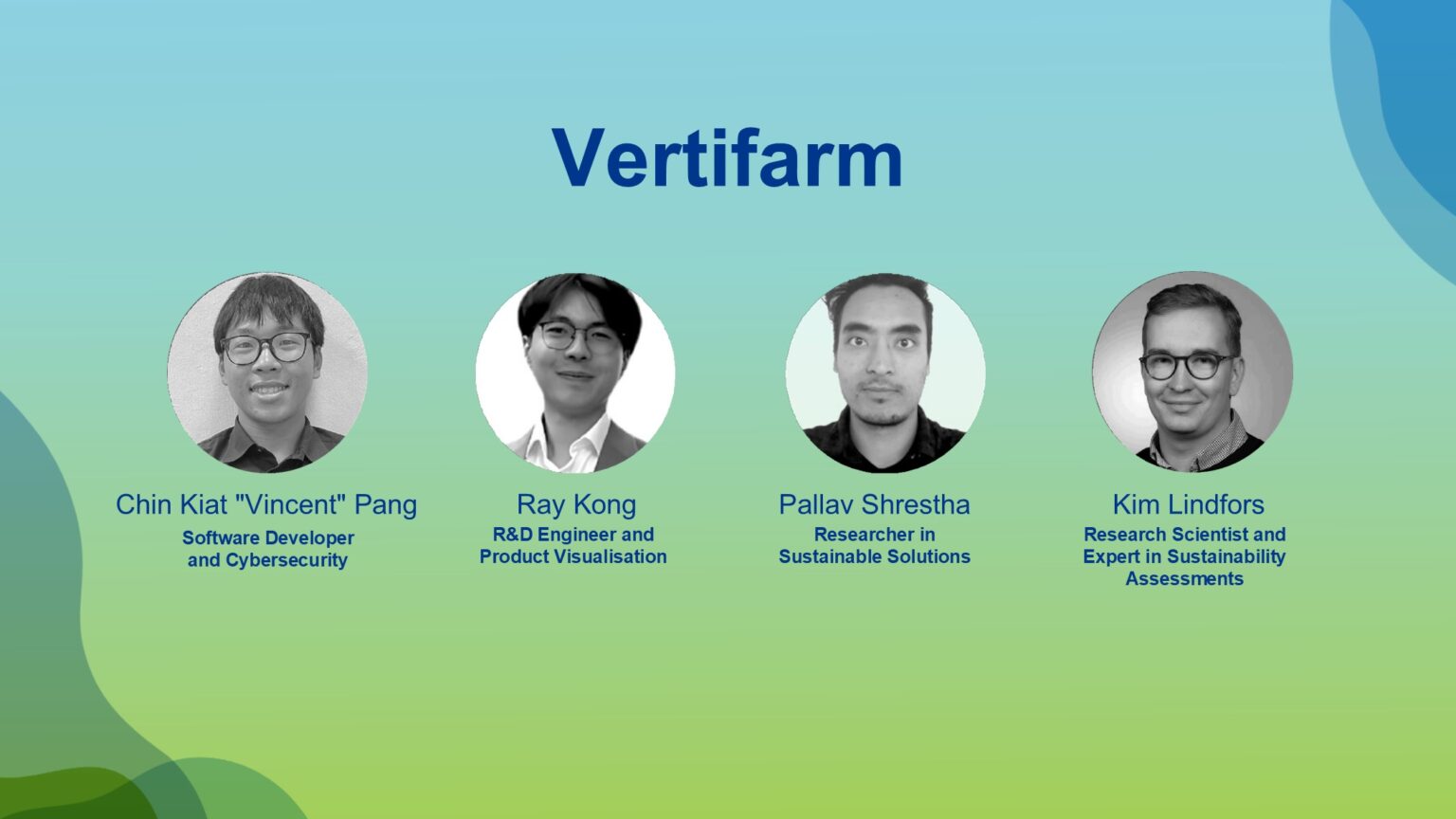
Vlora Green Harvest Guardians
Members: Emanuel Opingari, Sefeda Lazaj, Aulona Veizi, Eriselda Kullolli, Ledjan Paja, Arjol THomaraj, Esmeralda Kapaj, Dr Pjerin Preka and Prof. Dr. Fran Gjoka.
Challenge: The Ministry of Agriculture subsidizes around 1.5 million euros every year for farmers affected by climate change (such as hail, drought, diseases and viruses, etc.); approximately 200,000 farmers are harmed every year. The establishment of an Agricultural Information Center will provide climate data and cultivation techniques, reducing dependence on subsidies, improving productivity and sustainability, and improving rural life through advanced technologies and sustainable practices.
